Full text
PDF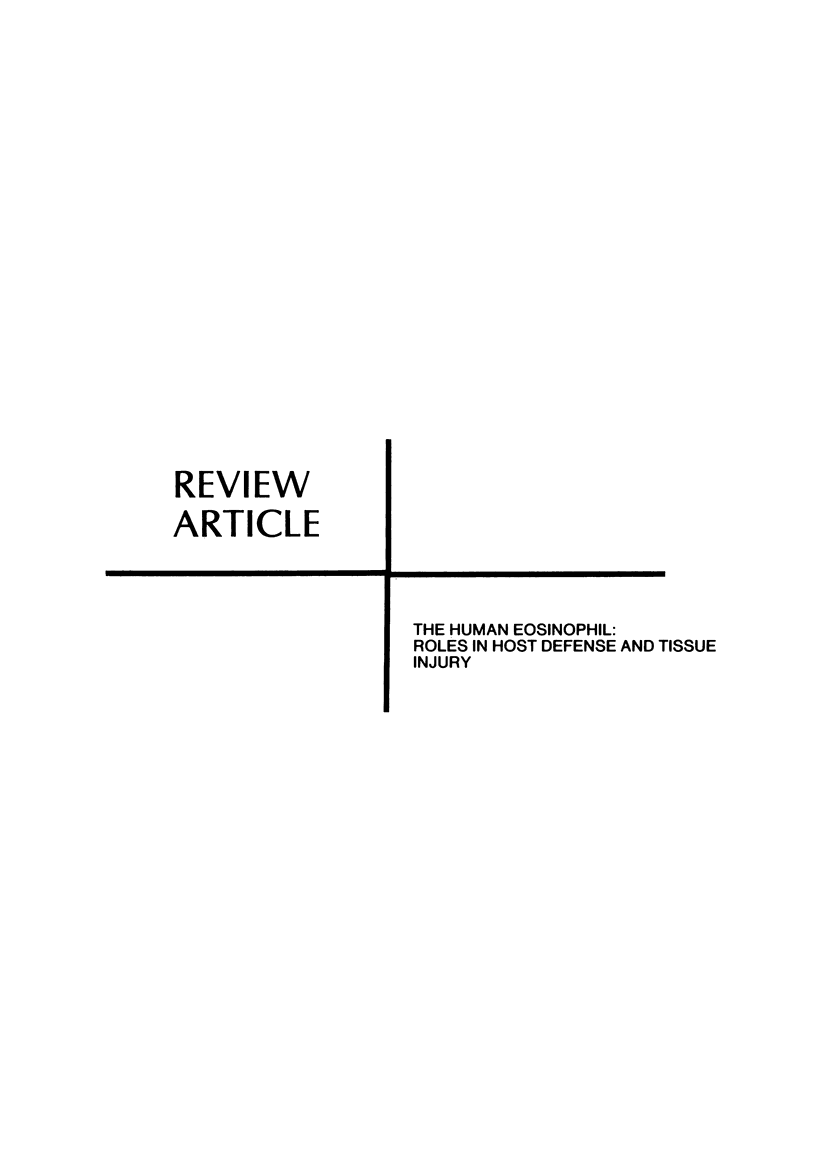
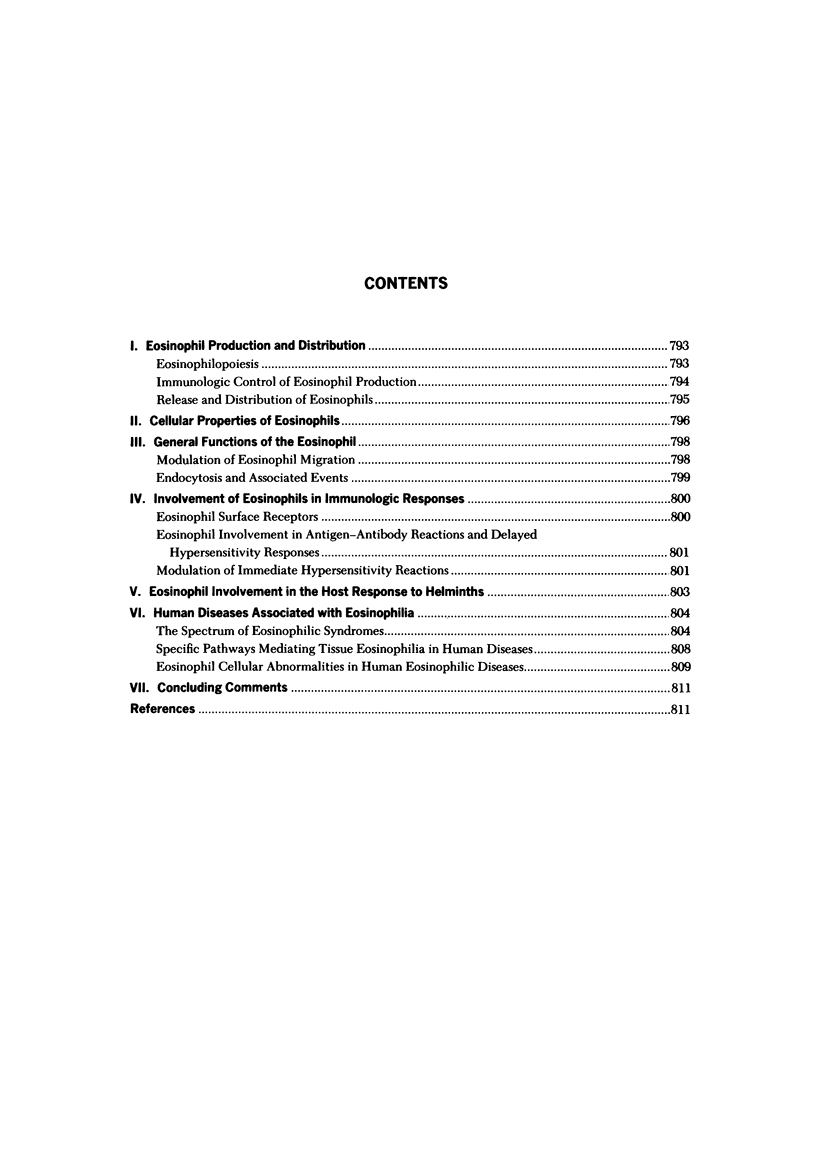
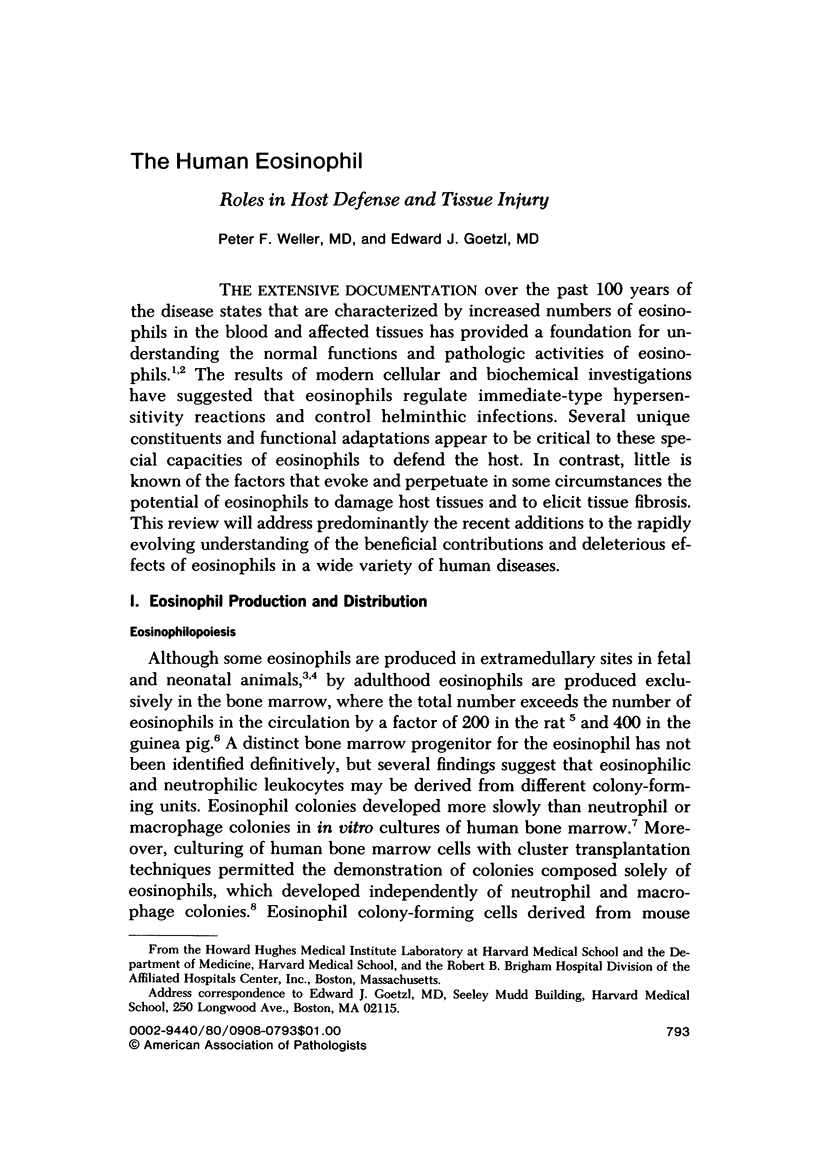
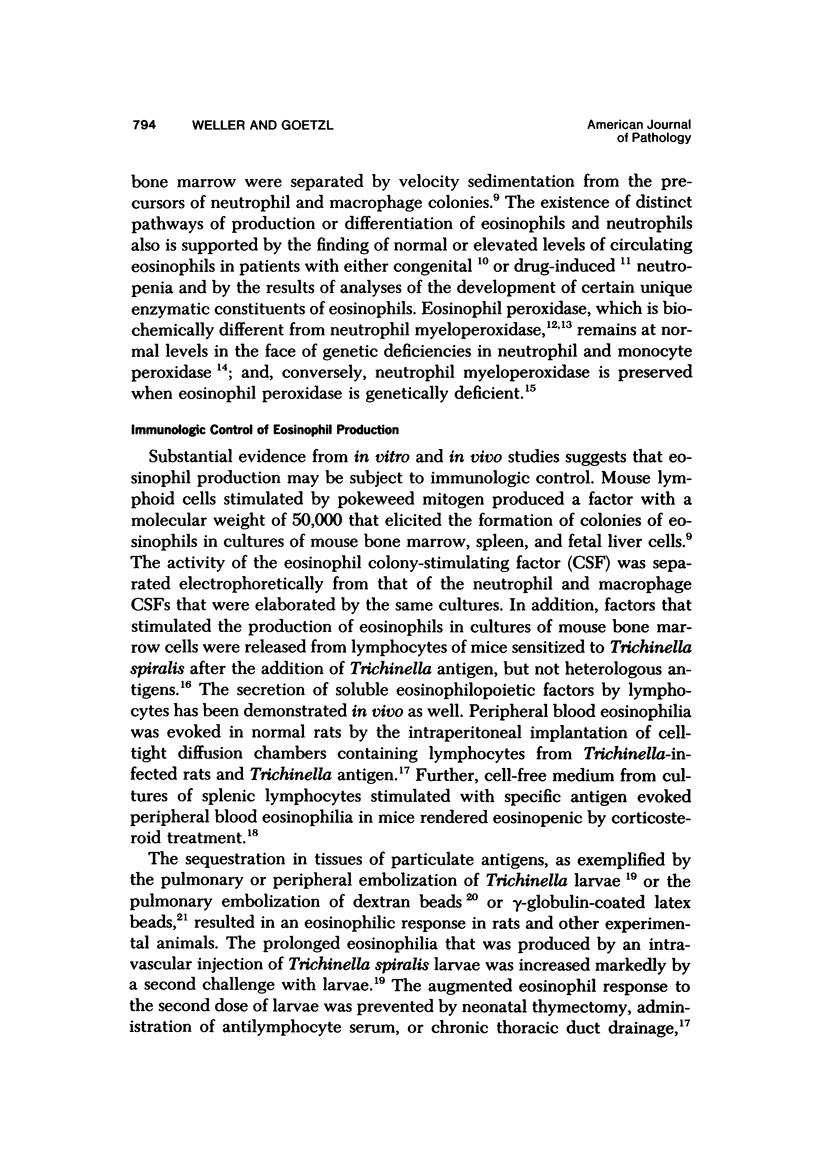
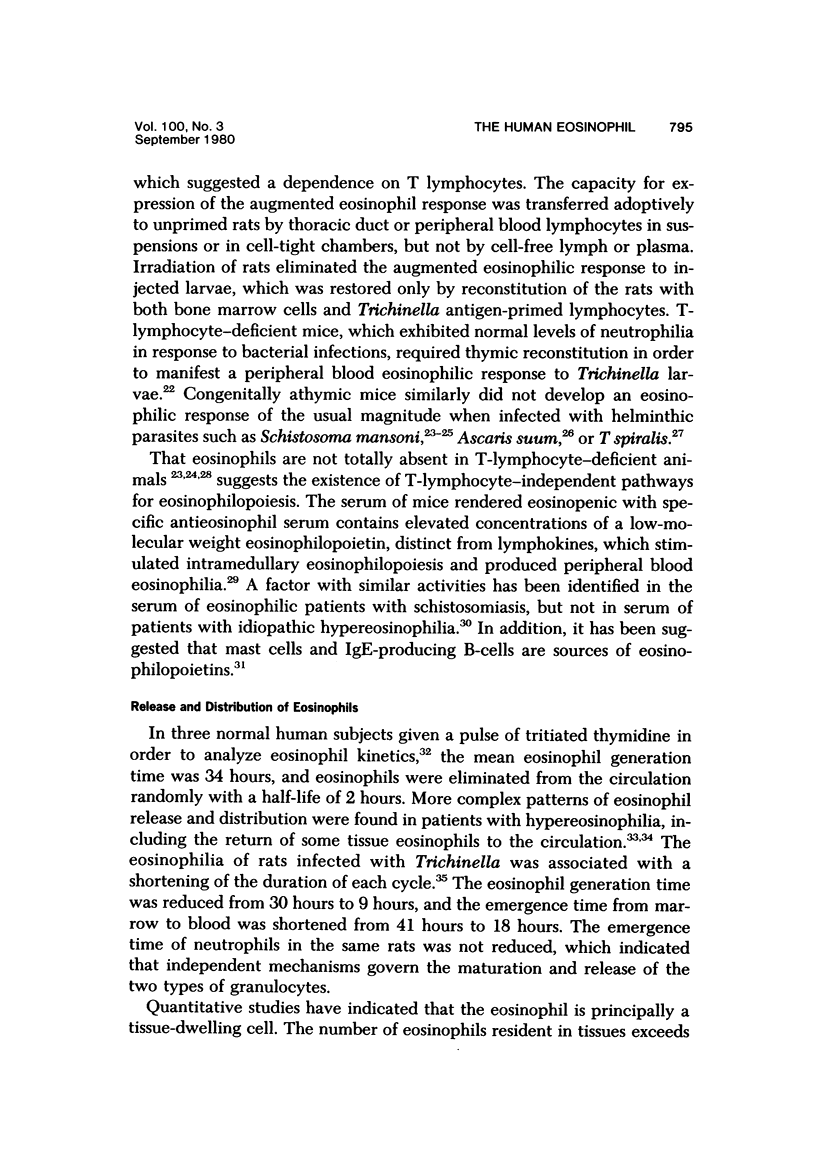
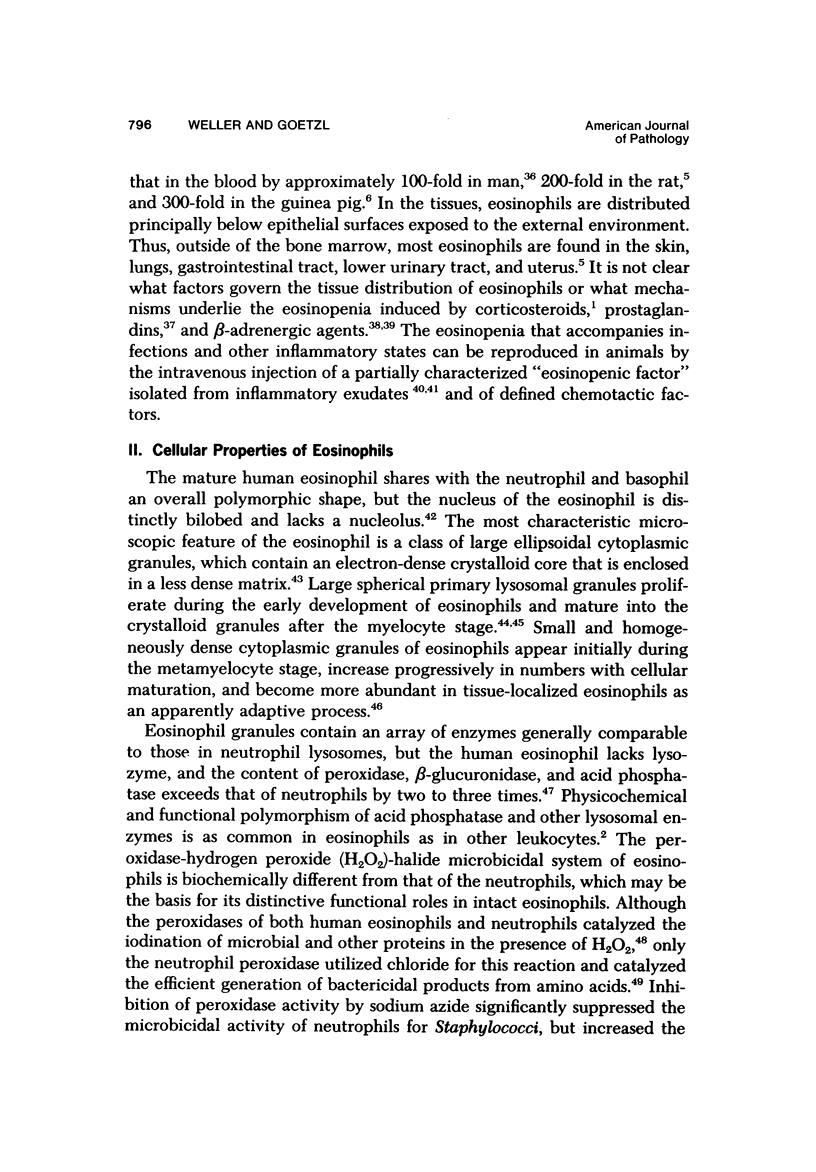
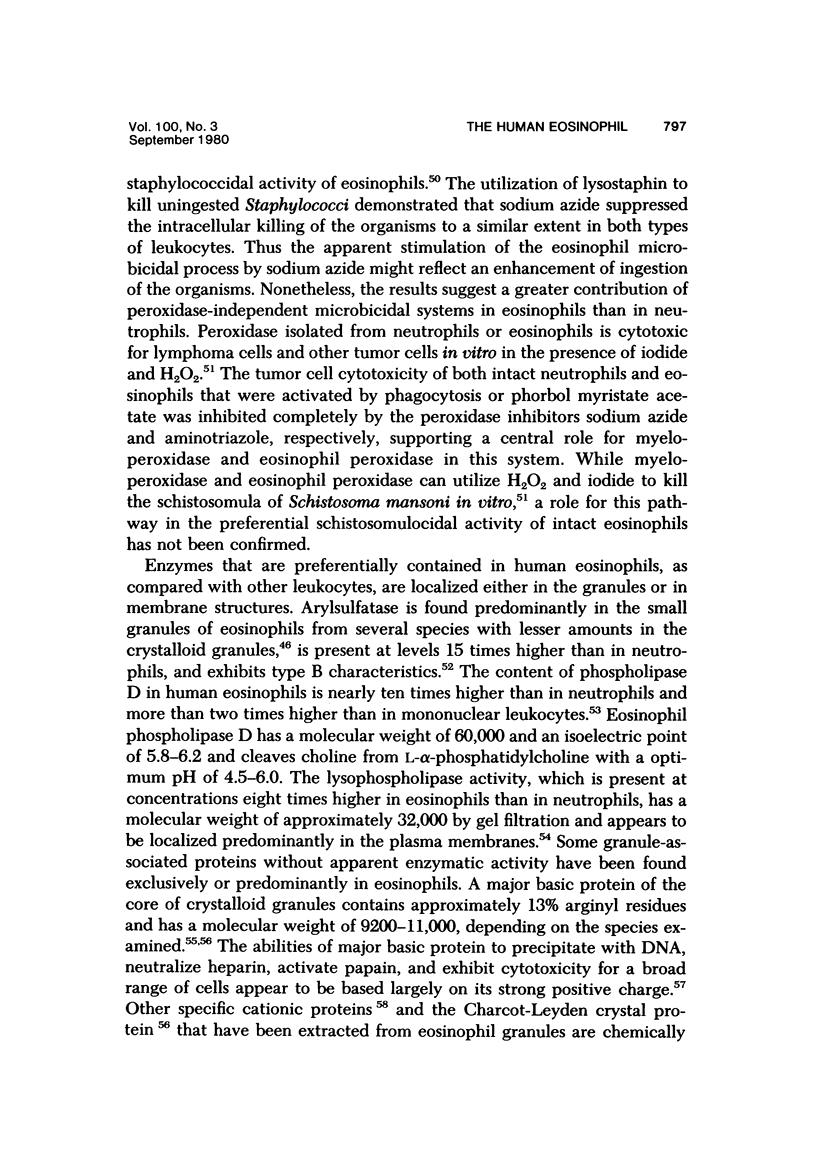
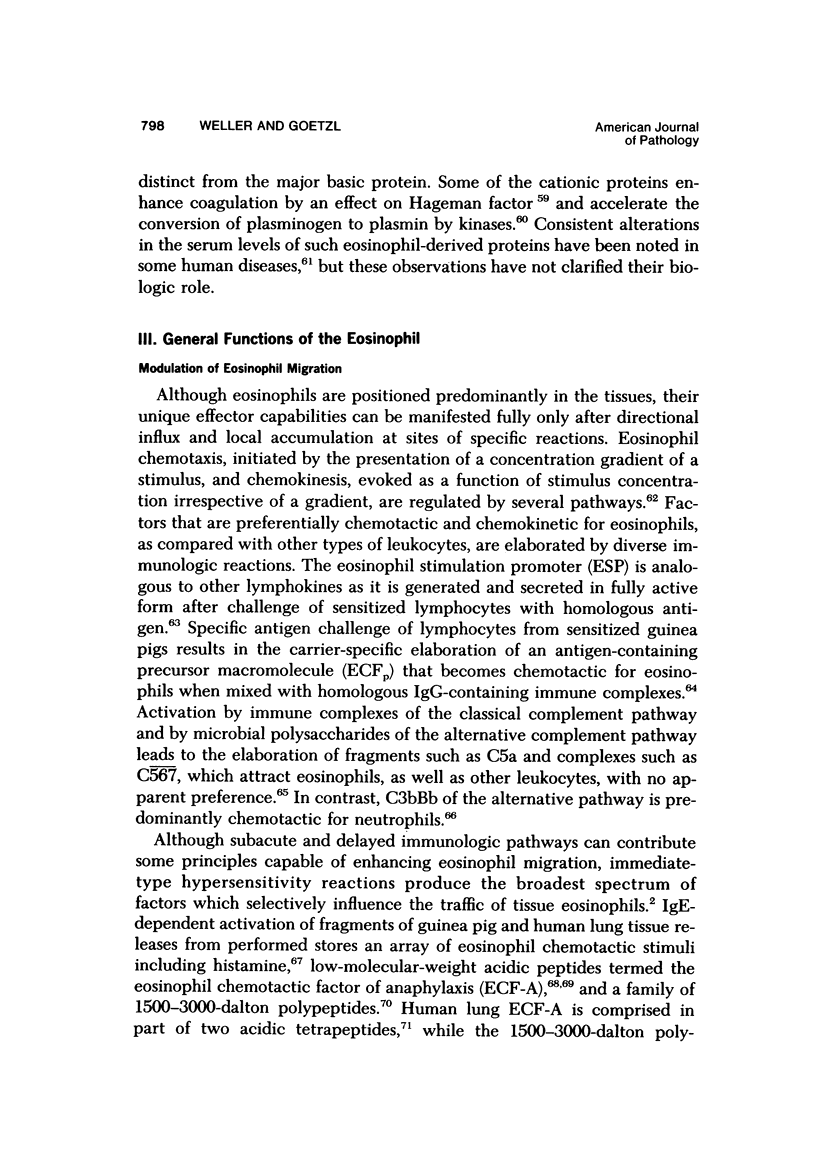
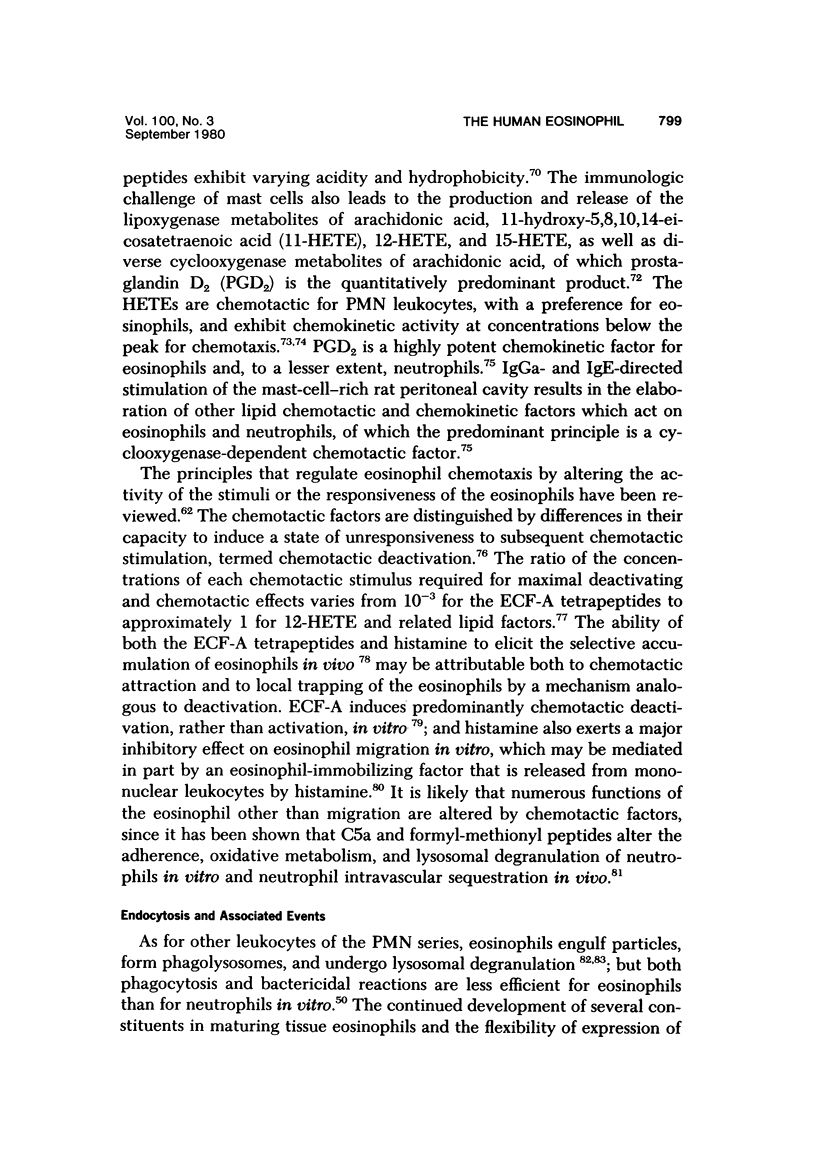
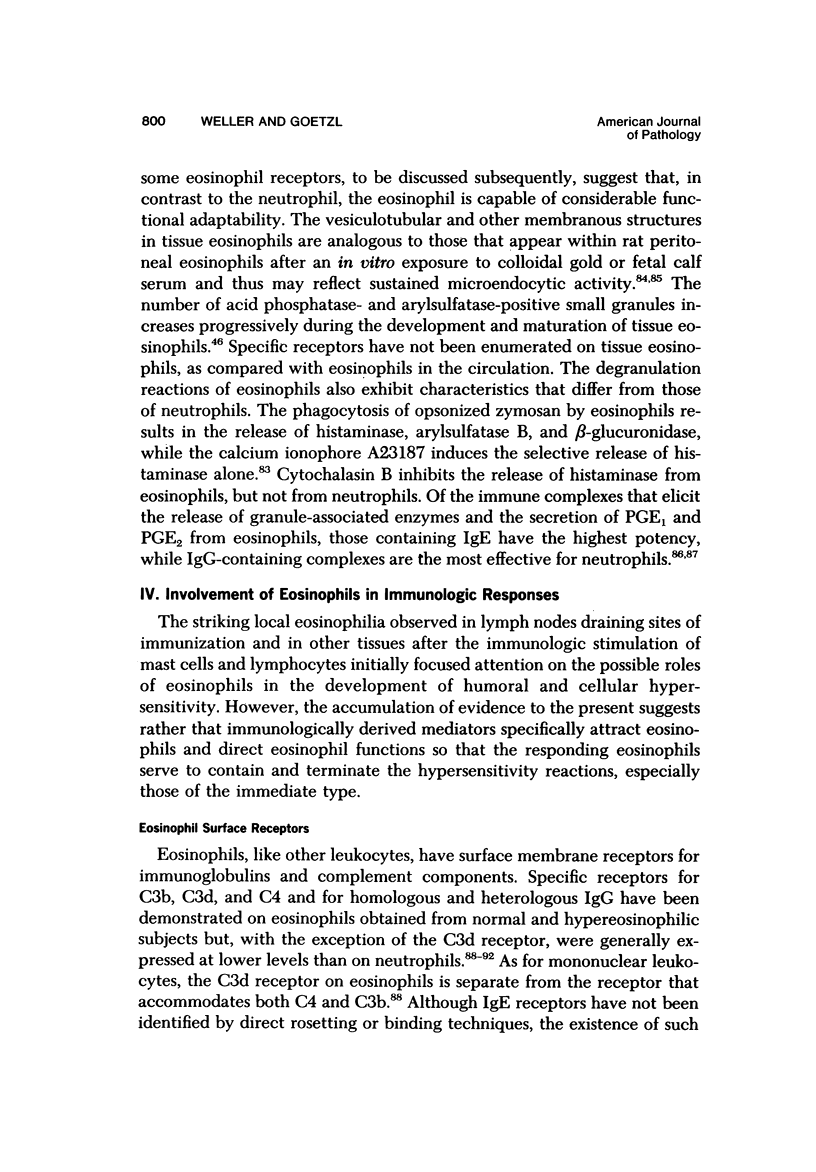
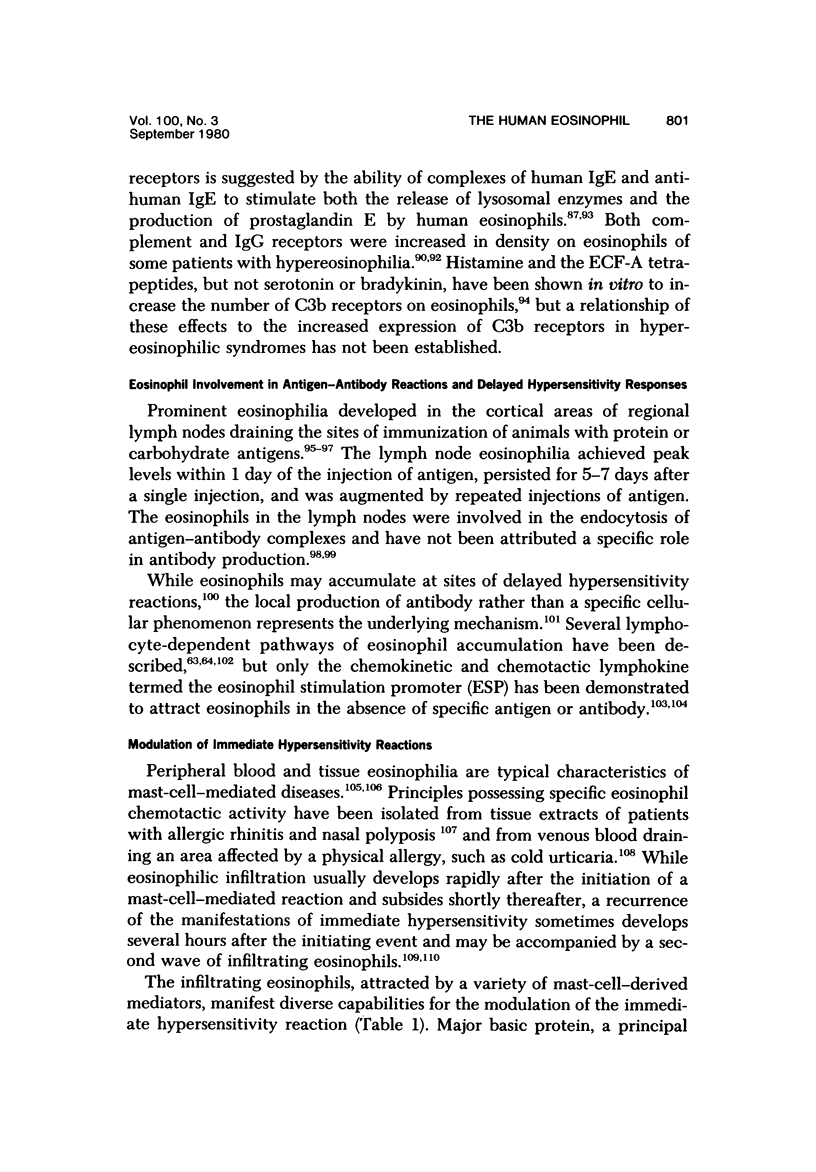
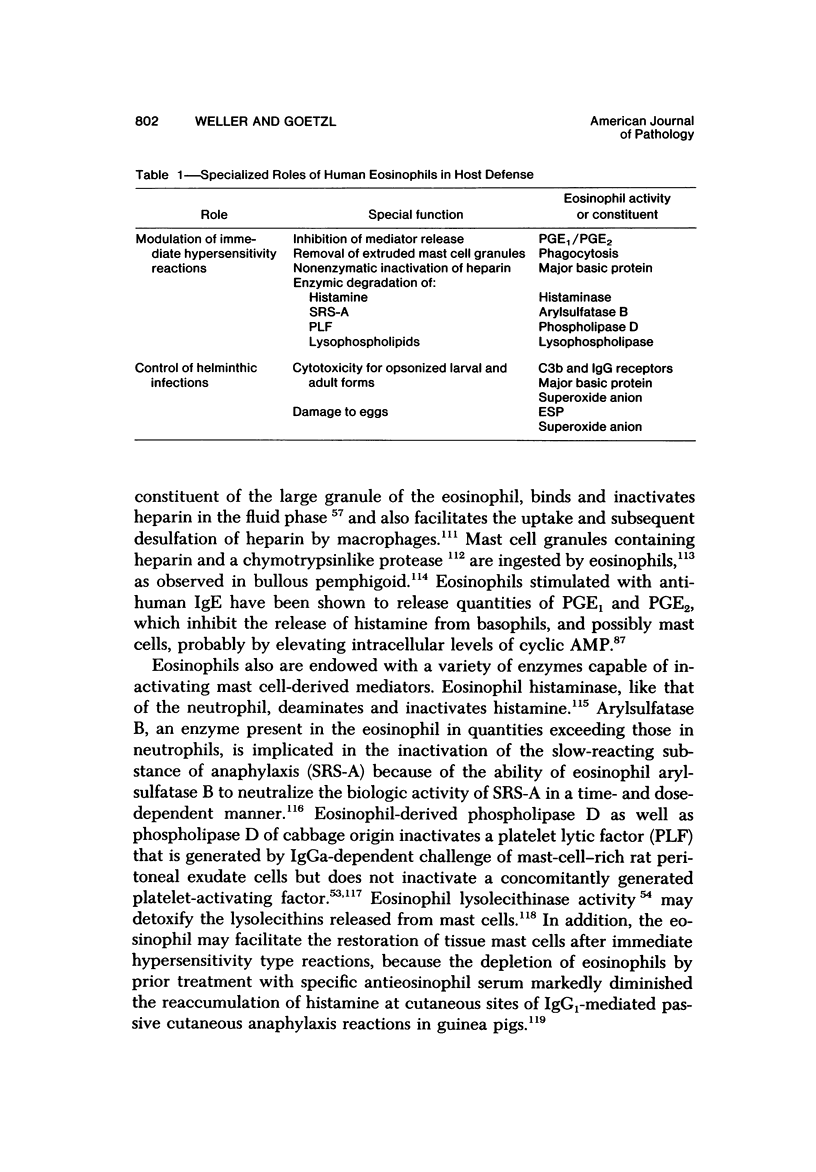
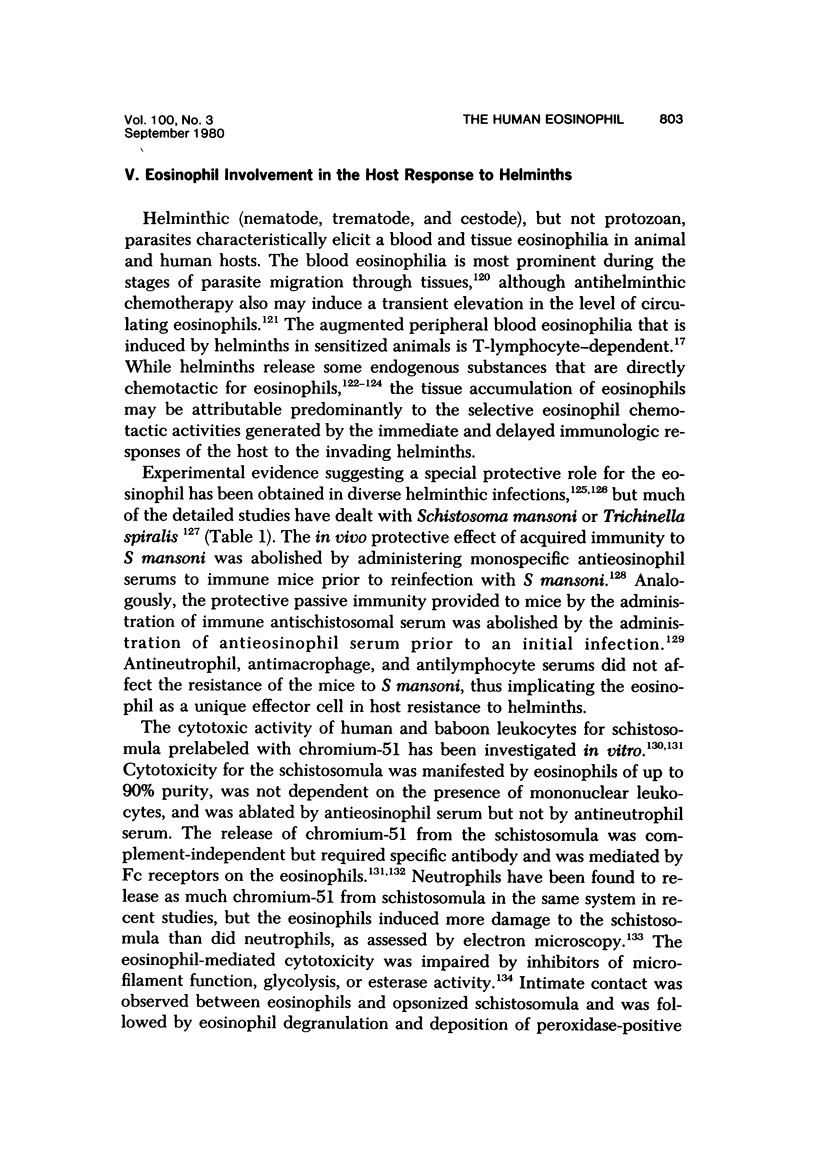
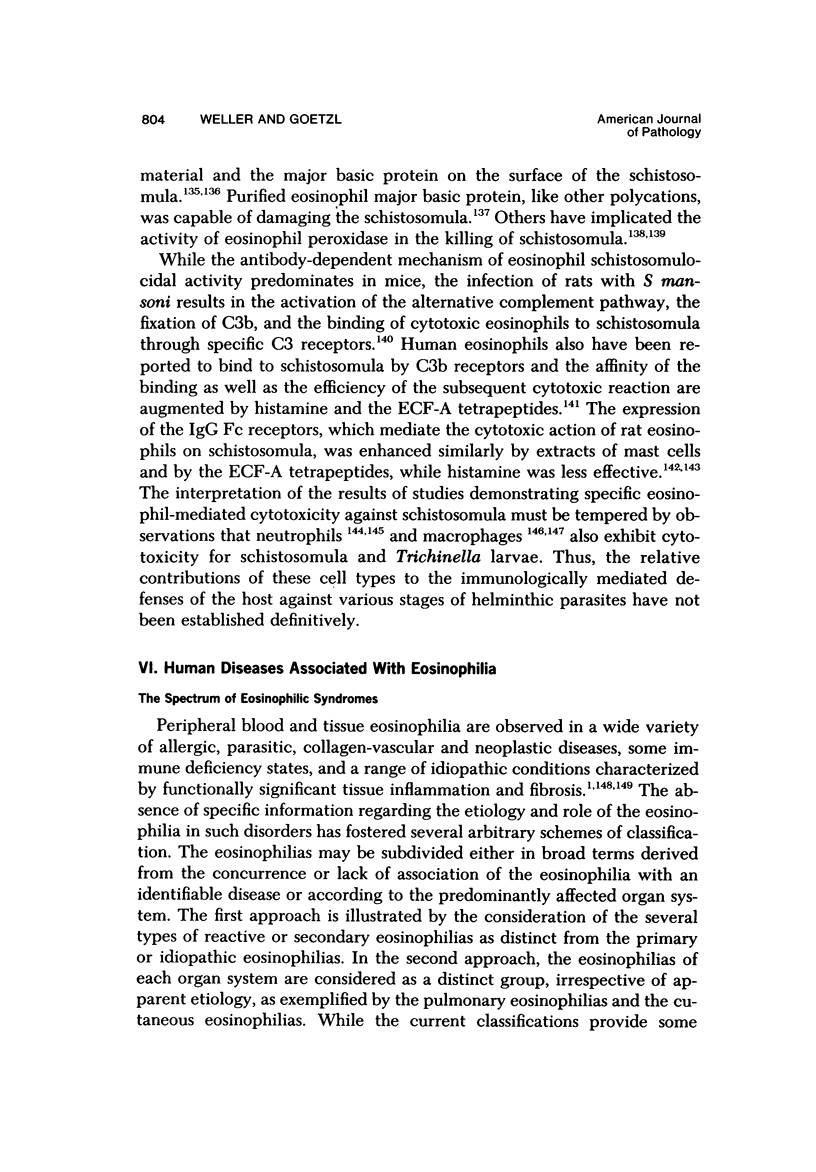
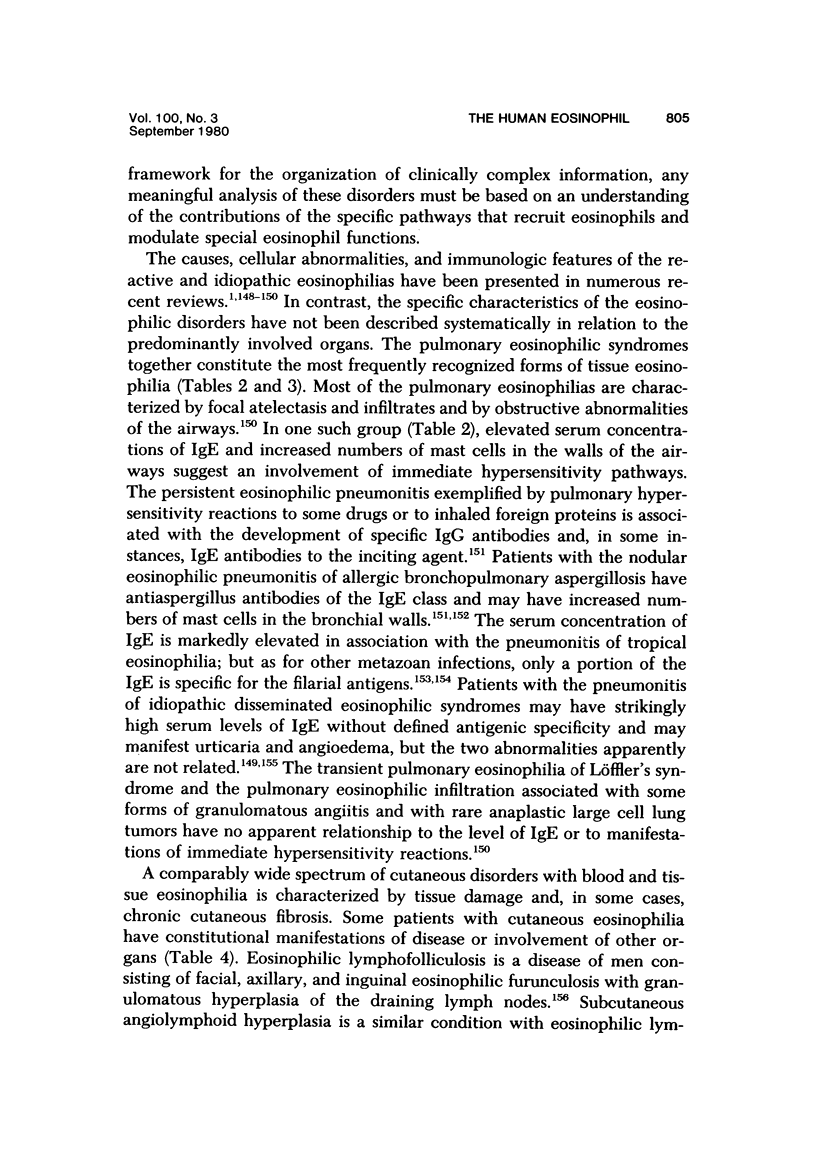
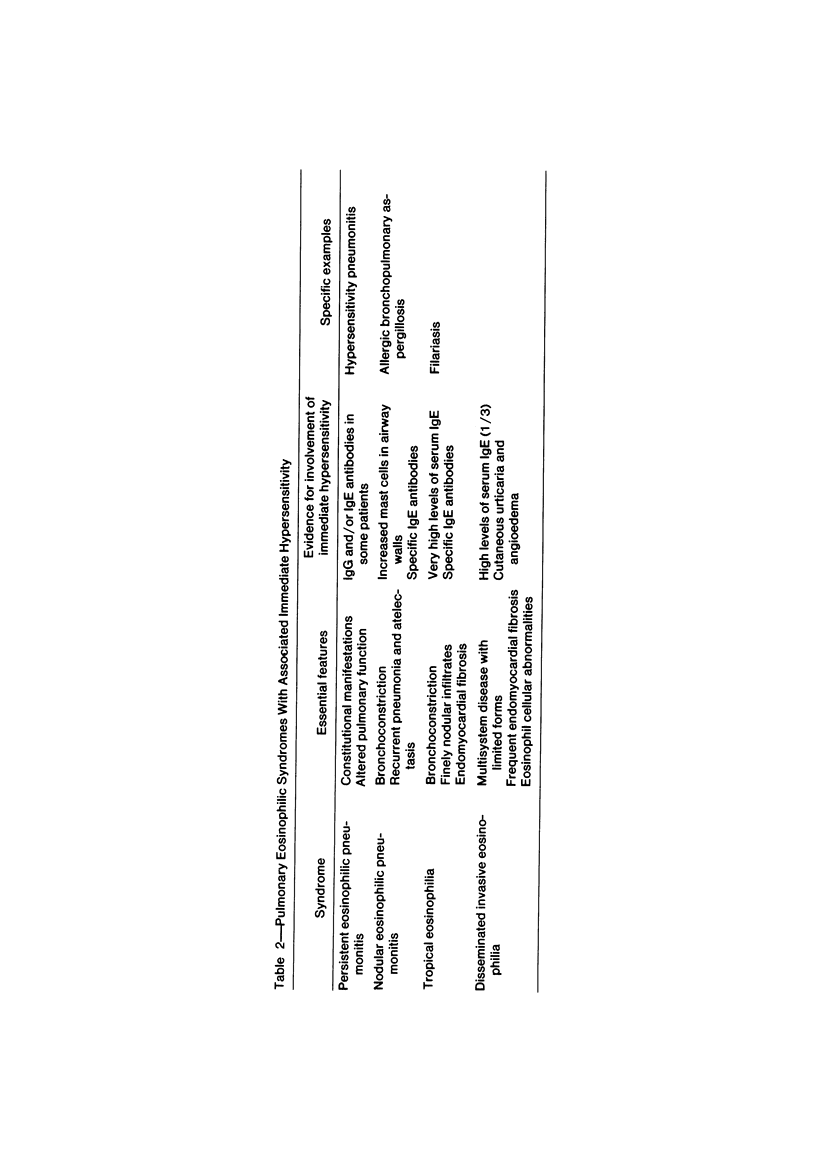
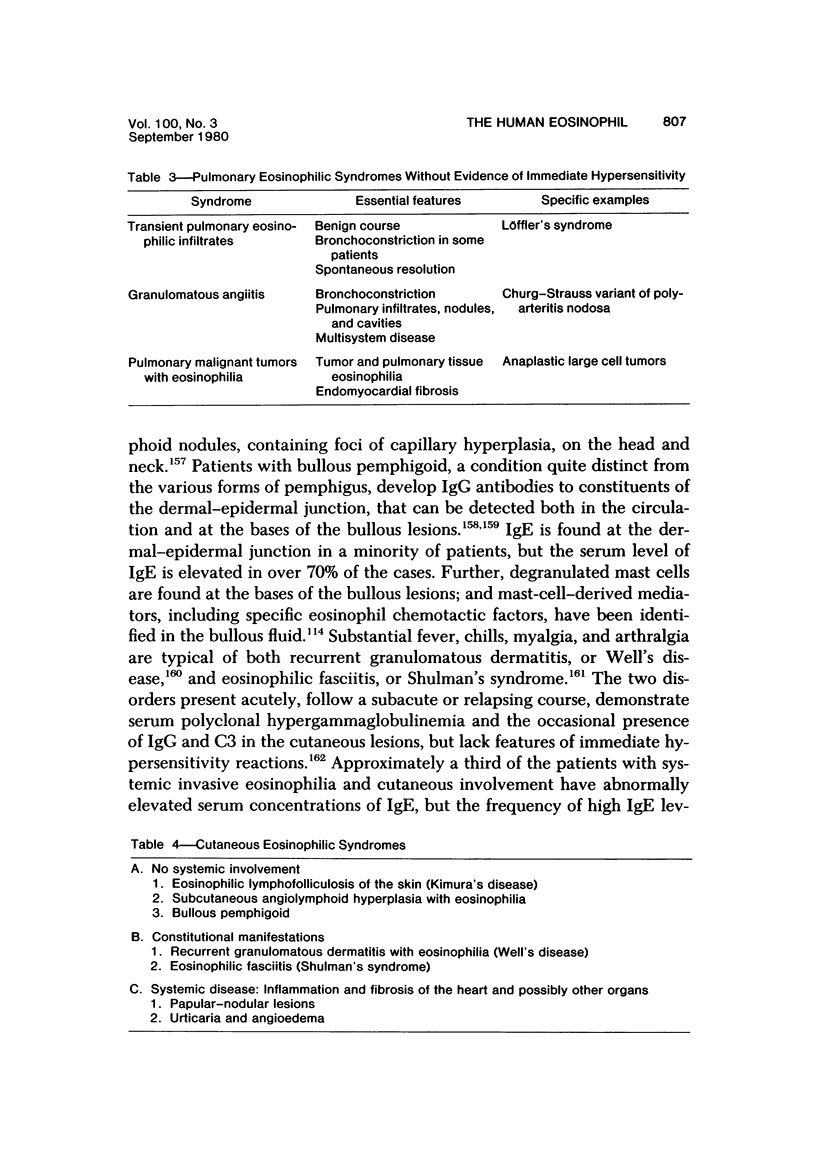
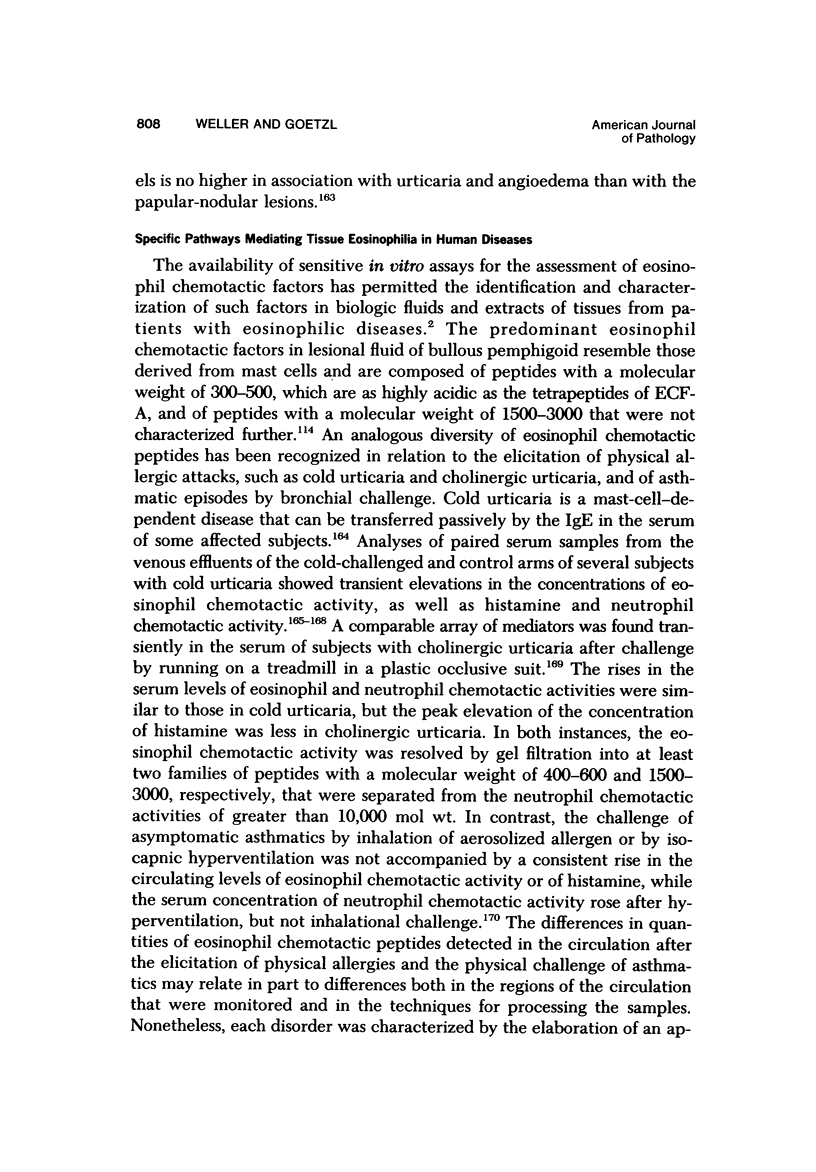
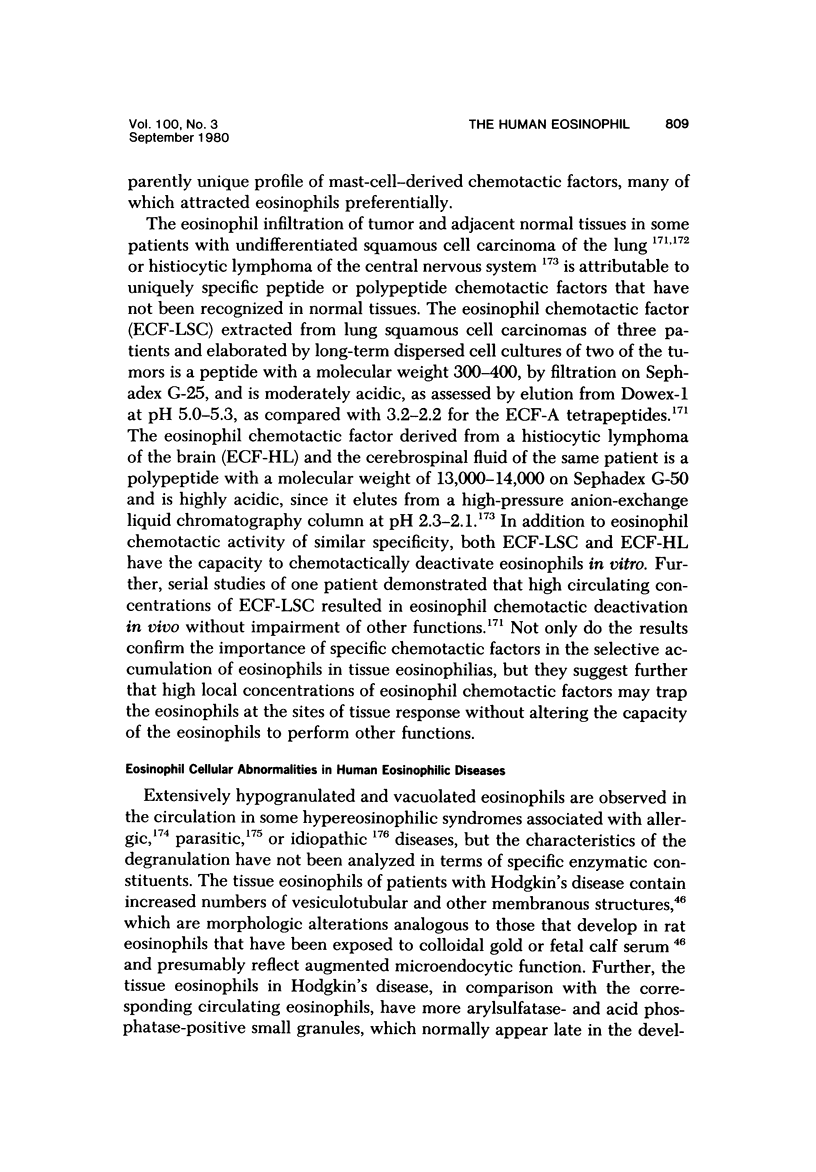
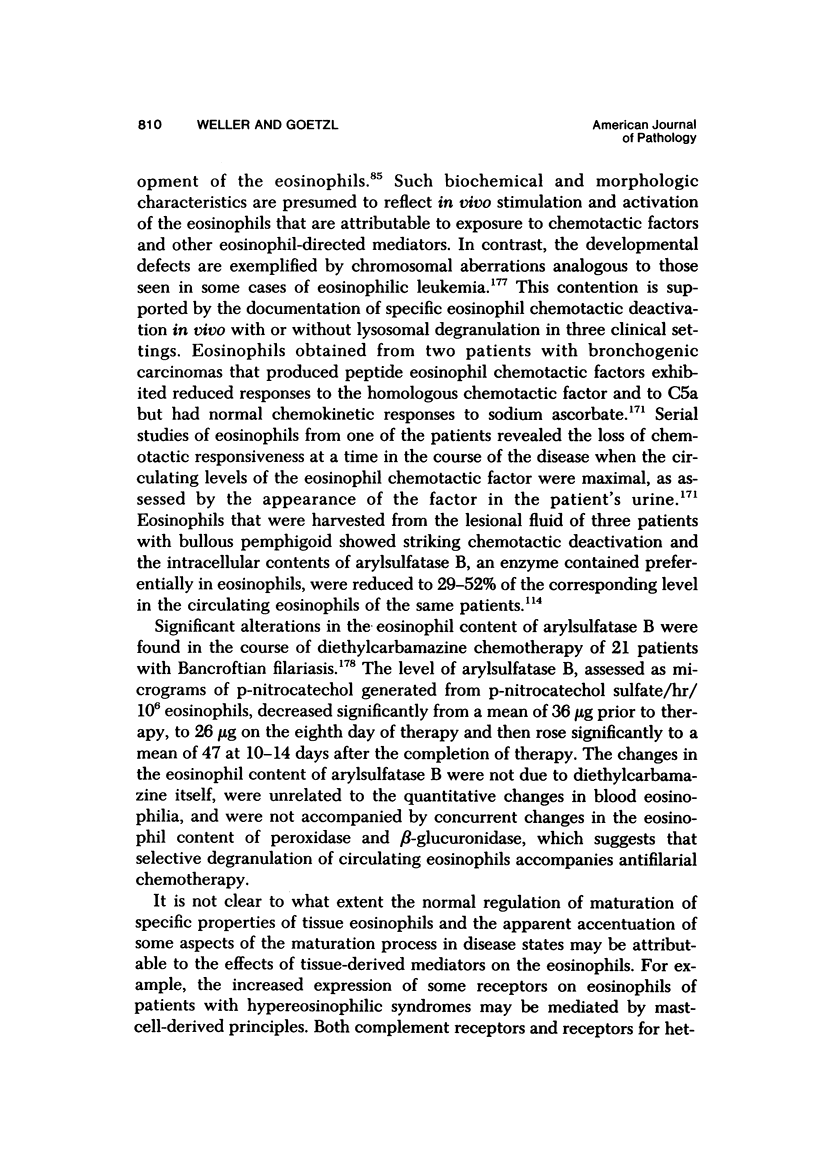
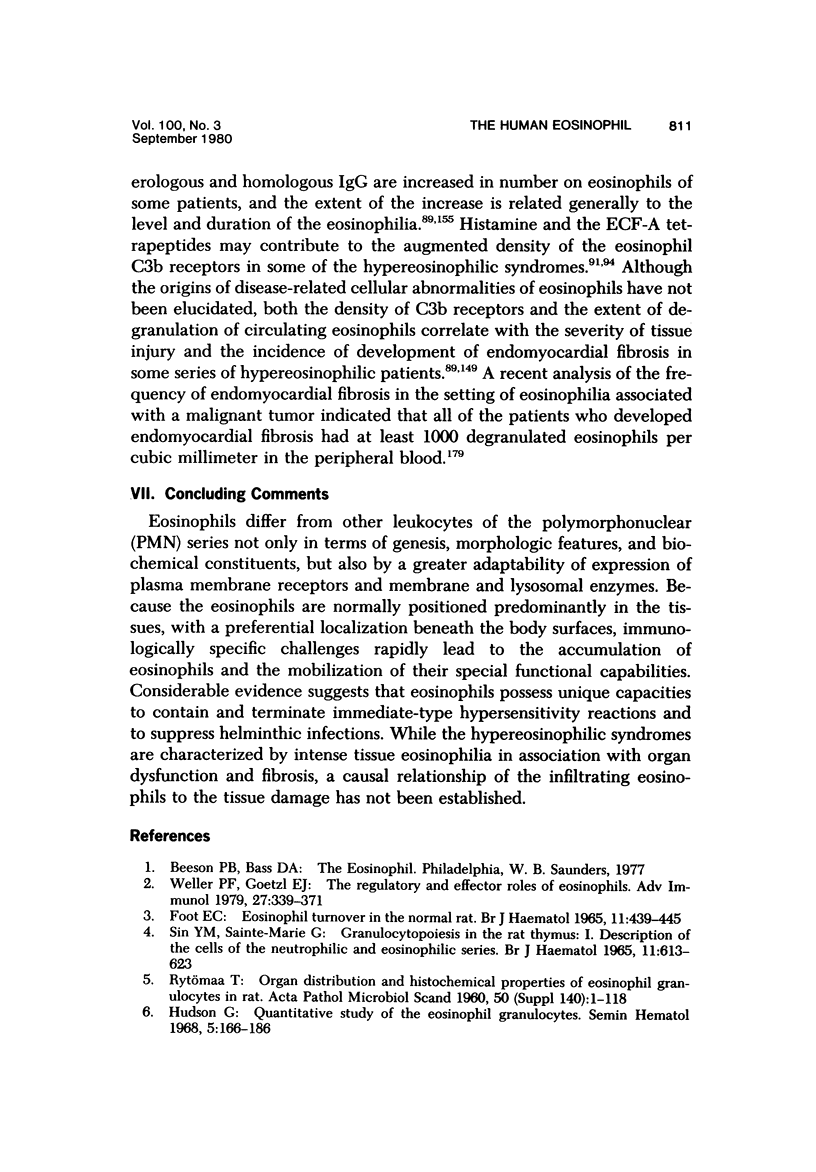
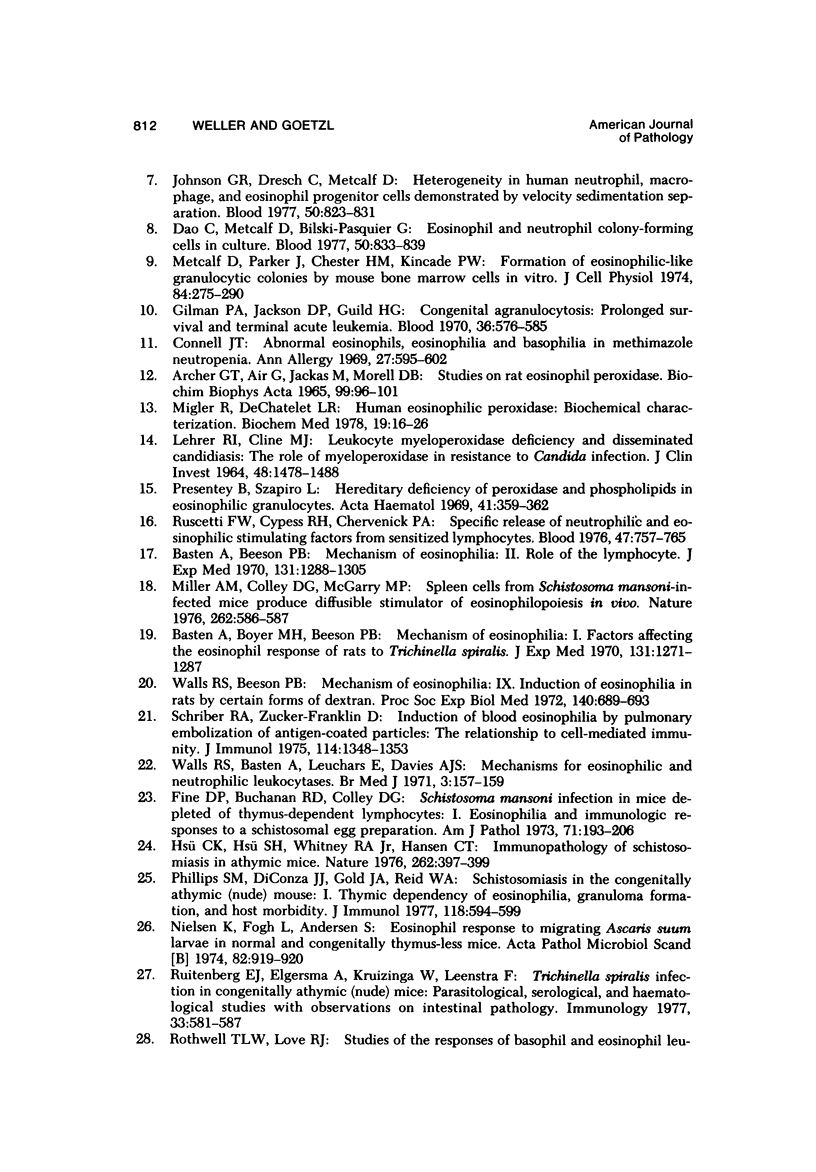
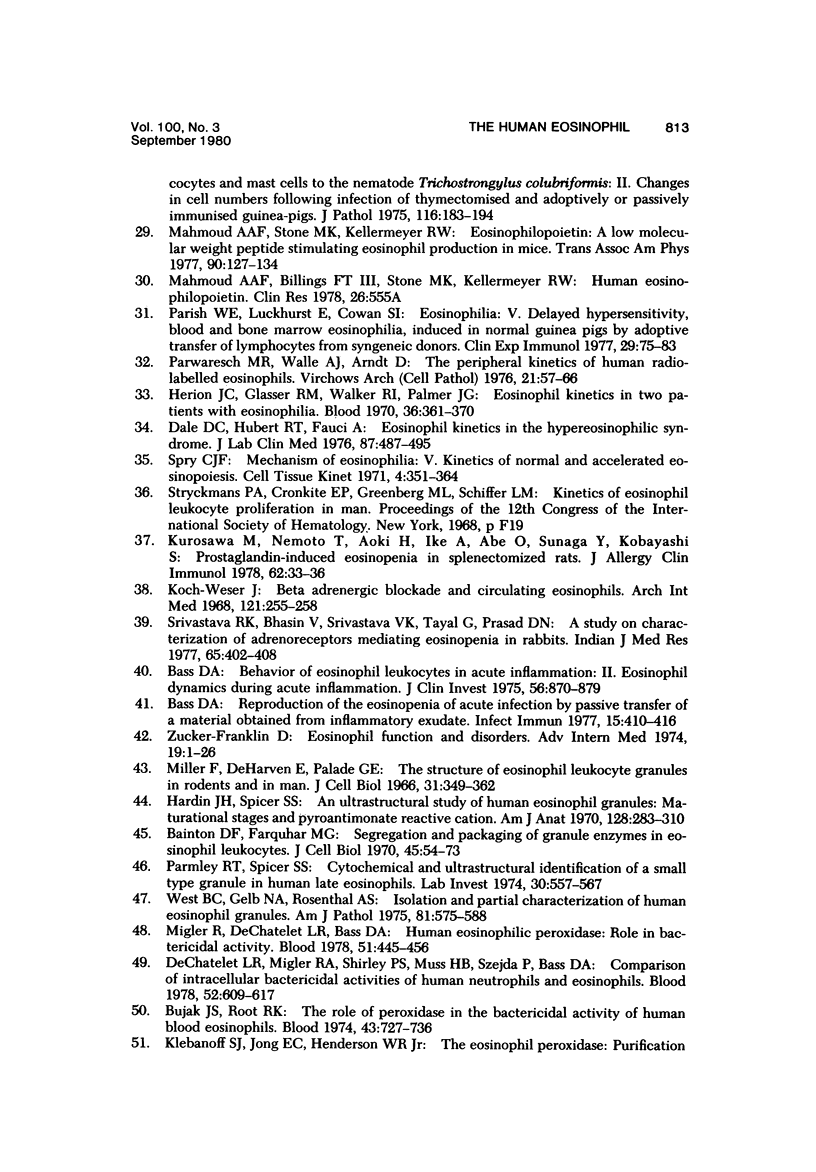
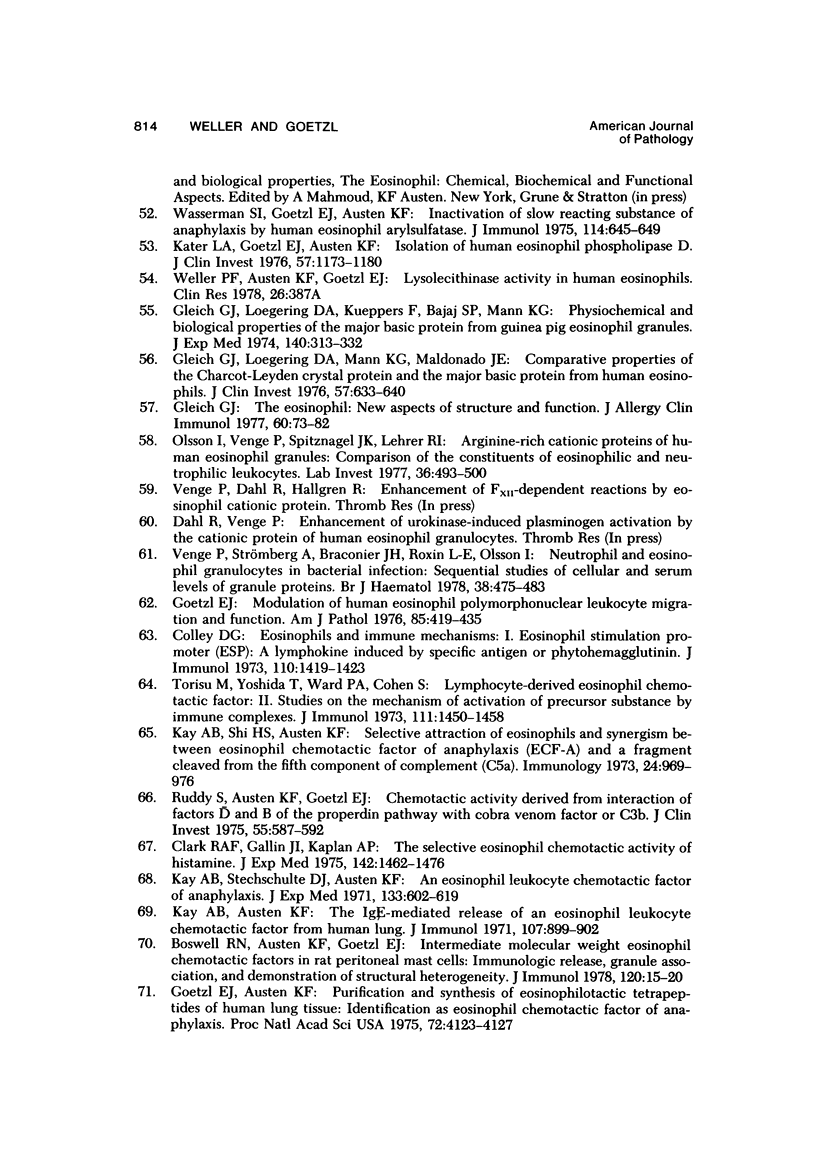
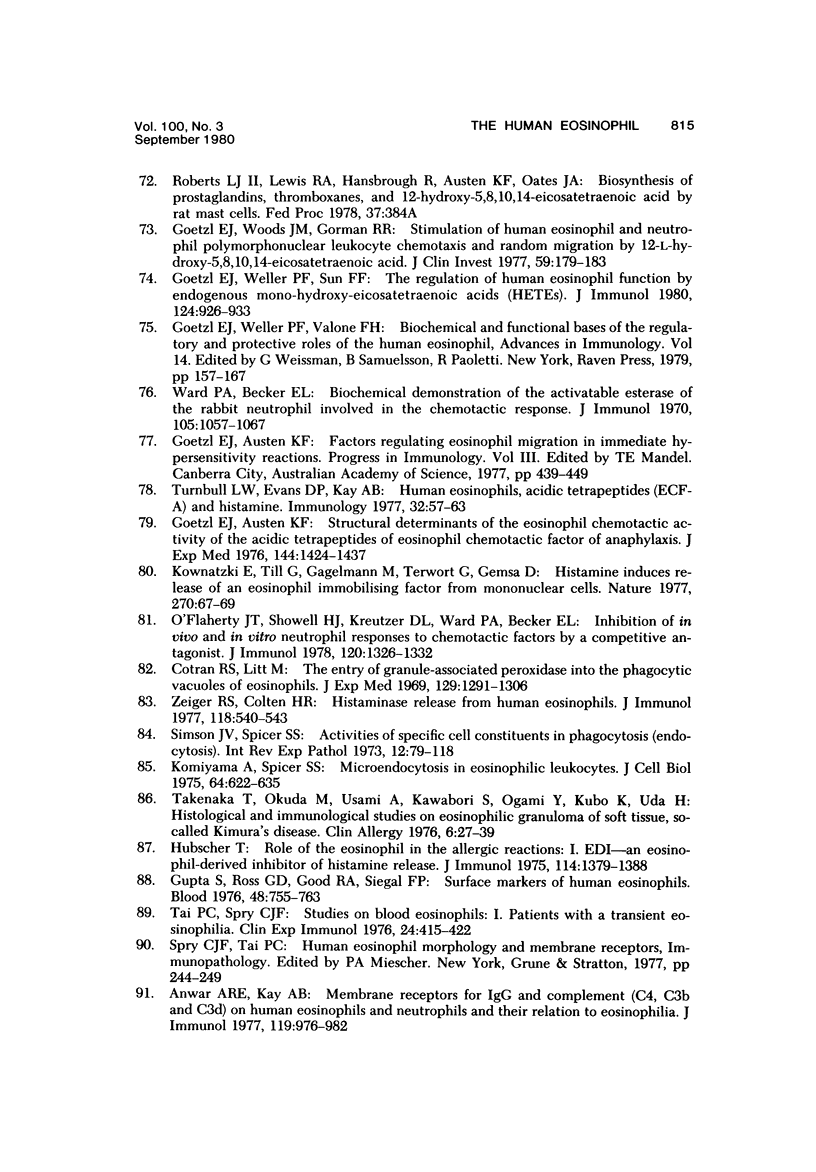
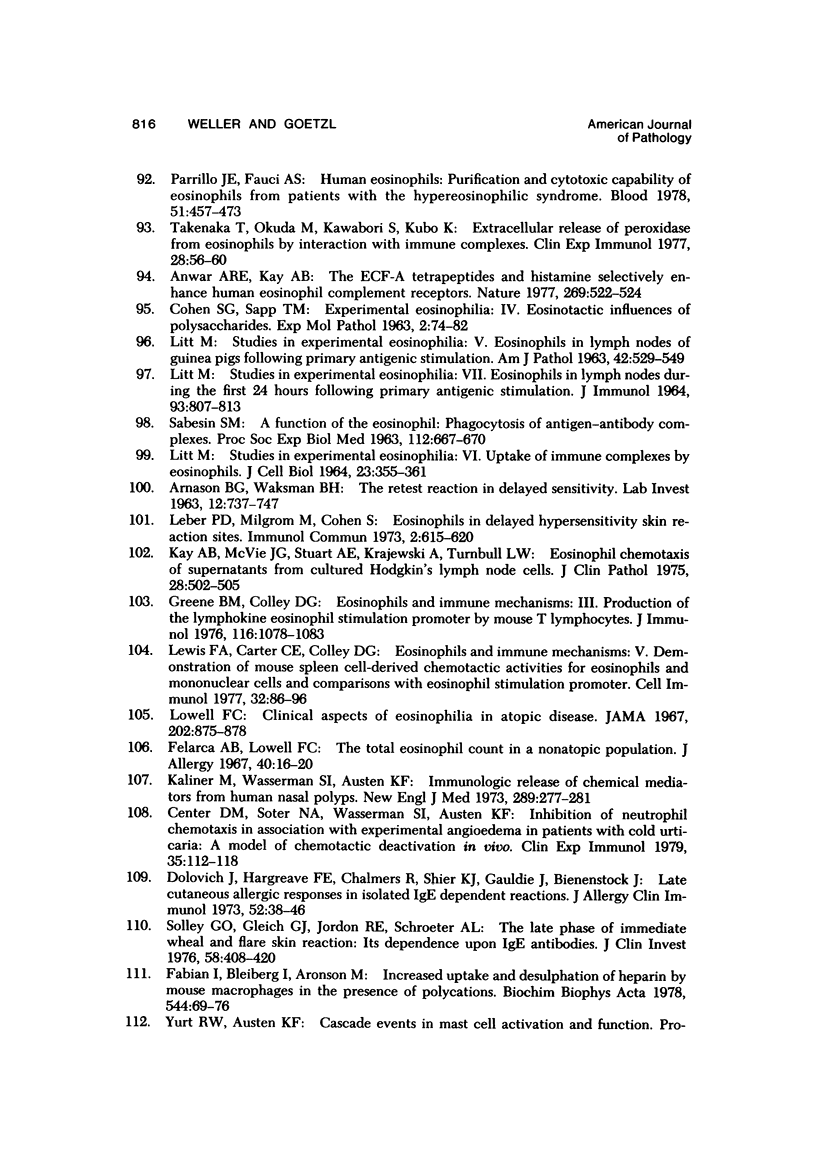
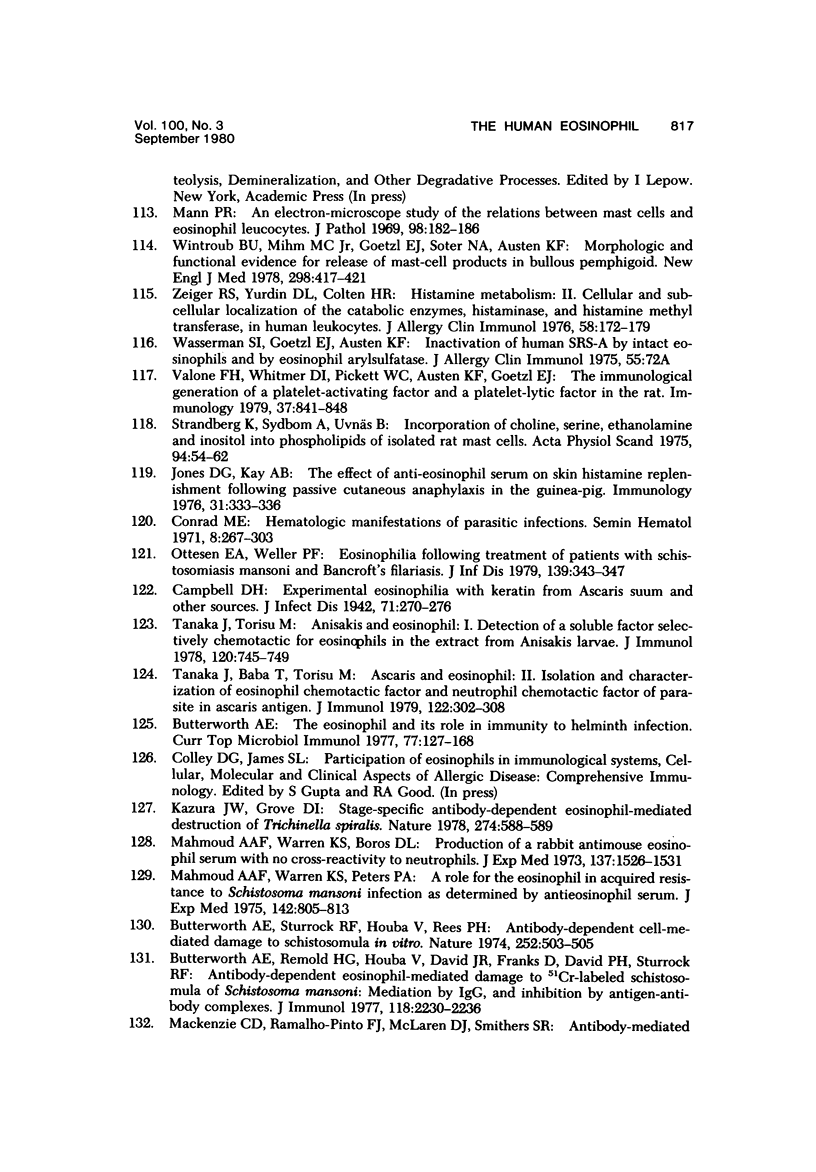
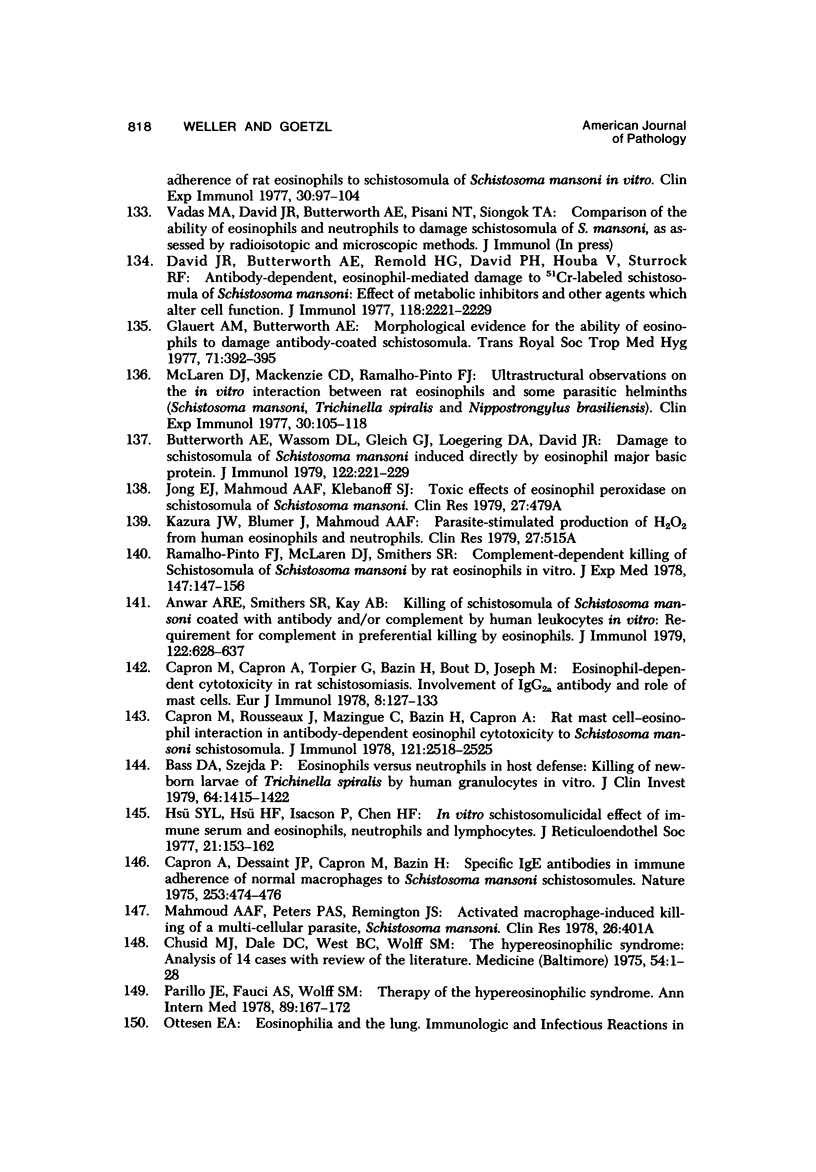
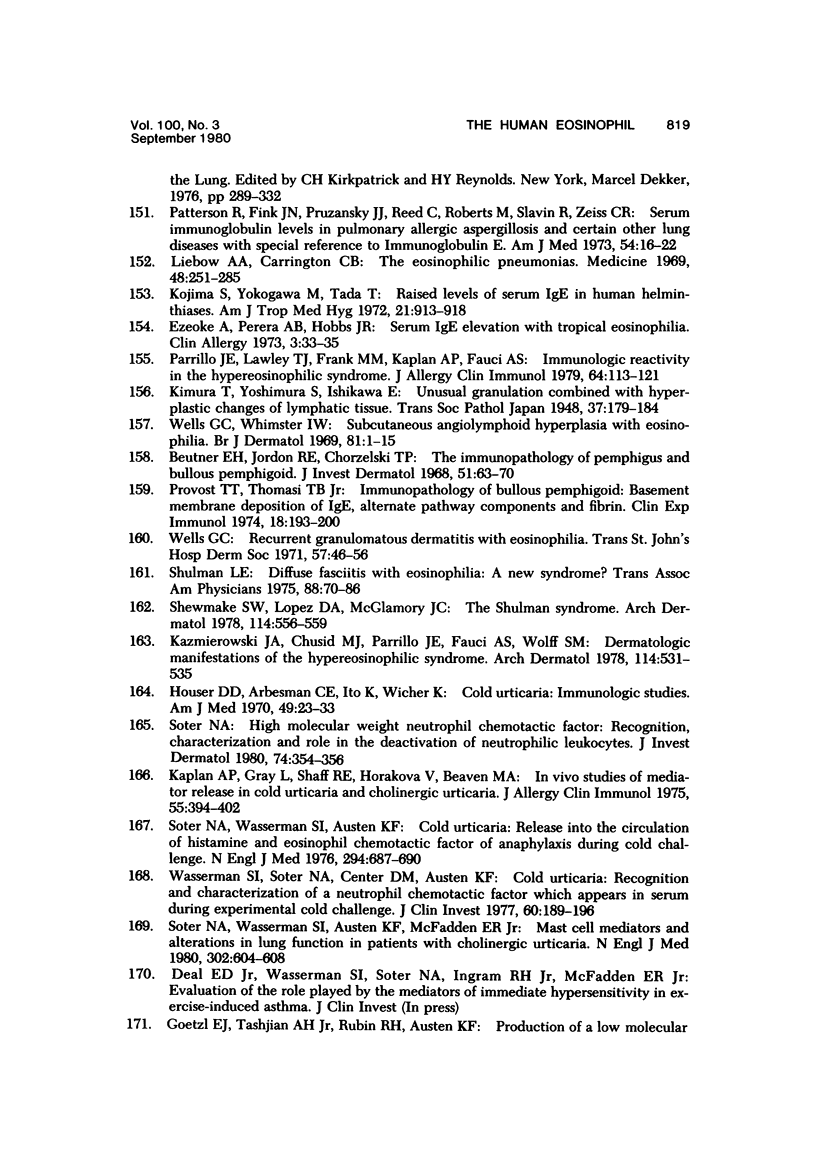
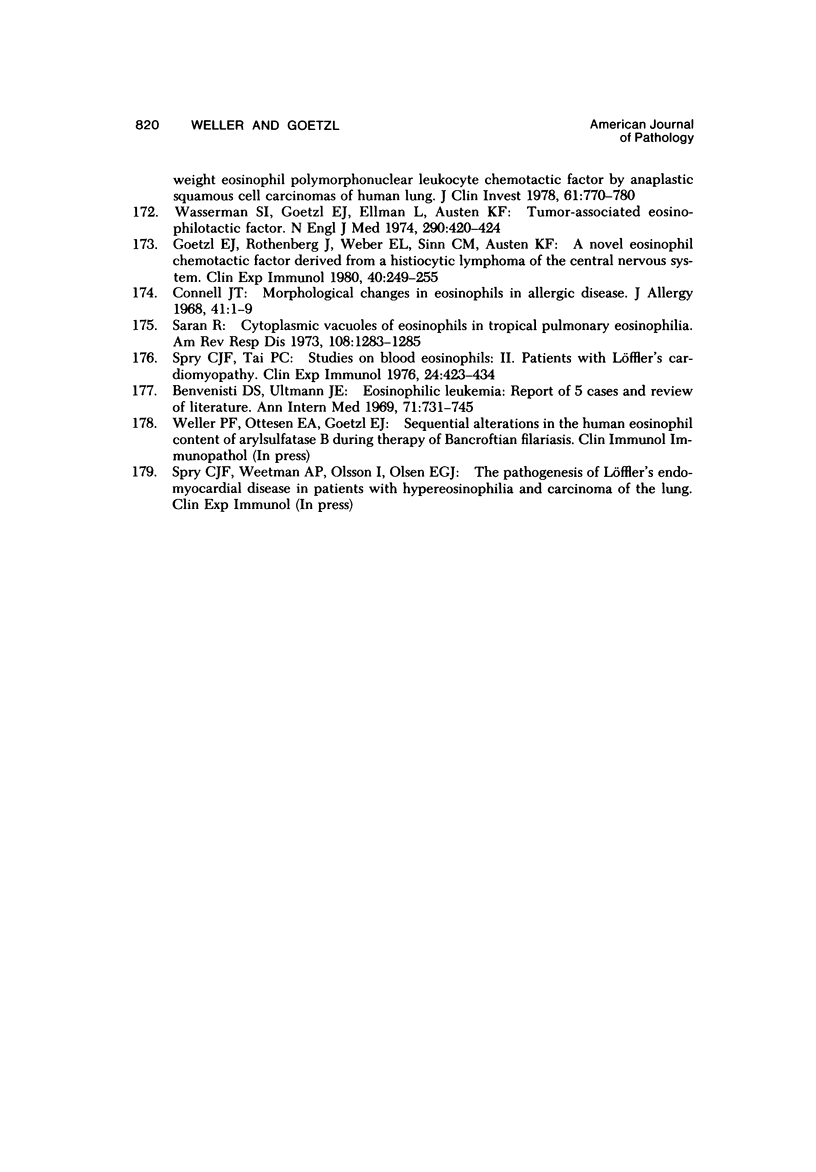
Selected References
These references are in PubMed. This may not be the complete list of references from this article.
- ARCHER G. T., AIR G., JACKAS M., MORELL D. B. STUDIES ON RAT EOSINOPHIL PEROXIDASE. Biochim Biophys Acta. 1965 Apr 26;99:96–101. doi: 10.1016/s0926-6593(65)80010-8. [DOI] [PubMed] [Google Scholar]
- Anwar A. R., Kay A. B. Membrane receptors for IgG and complement (C4, C3b and C3d) on human eosinophils and neutrophils and their relation to eosinophilia. J Immunol. 1977 Sep;119(3):976–982. [PubMed] [Google Scholar]
- Anwar A. R., Kay A. B. The ECF-A tetrapeptides and histamine selectively enhance human eosinophil complement receptors. Nature. 1977 Oct 6;269(5628):522–524. doi: 10.1038/269522a0. [DOI] [PubMed] [Google Scholar]
- Anwar A. R., Smithers S. R., Kay A. B. Killing of schistosomula of Schistosoma mansoni coated with antibody and/or complement by human leukocytes in vitro: requirement for complement in preferential killing by eosinophils. J Immunol. 1979 Feb;122(2):628–637. [PubMed] [Google Scholar]
- Bainton D. F., Farquhar M. G. Segregation and packaging of granule enzymes in eosinophilic leukocytes. J Cell Biol. 1970 Apr;45(1):54–73. doi: 10.1083/jcb.45.1.54. [DOI] [PMC free article] [PubMed] [Google Scholar]
- Bass D. A. Behavior of eosinophil leukocytes in acute inflammation. II. Eosinophil dynamics during acute inflammation. J Clin Invest. 1975 Oct;56(4):870–879. doi: 10.1172/JCI108166. [DOI] [PMC free article] [PubMed] [Google Scholar]
- Bass D. A. Reproduction of the eosinopenia of acute infection by passive transfer of a material obtained from inflammatory exudate. Infect Immun. 1977 Feb;15(2):410–416. doi: 10.1128/iai.15.2.410-416.1977. [DOI] [PMC free article] [PubMed] [Google Scholar]
- Bass D. A., Szejda P. Eosinophils versus neutrophils in host defense. Killing of newborn larvae of Trichinella spiralis by human granulocytes in vitro. J Clin Invest. 1979 Nov;64(5):1415–1422. doi: 10.1172/JCI109599. [DOI] [PMC free article] [PubMed] [Google Scholar]
- Basten A., Beeson P. B. Mechanism of eosinophilia. II. Role of the lymphocyte. J Exp Med. 1970 Jun 1;131(6):1288–1305. doi: 10.1084/jem.131.6.1288. [DOI] [PMC free article] [PubMed] [Google Scholar]
- Basten A., Boyer M. H., Beeson P. B. Mechanism of eosinophilia. I. Factors affecting the eosinophil response of rats to Trichinella spiralis. J Exp Med. 1970 Jun 1;131(6):1271–1287. doi: 10.1084/jem.131.6.1271. [DOI] [PMC free article] [PubMed] [Google Scholar]
- Benvenisti D. S., Ultmann J. E. Eosinophilic leukemia. Report of five cases and review of literature. Ann Intern Med. 1969 Oct;71(4):731–745. doi: 10.7326/0003-4819-71-4-731. [DOI] [PubMed] [Google Scholar]
- Beutner E. H., Jordon R. E., Chorzelski T. P. The immunopathology of pemphigus and bullous pemphigoid. J Invest Dermatol. 1968 Aug;51(2):63–80. [PubMed] [Google Scholar]
- Boswell R. N., Austen K. F., Goetzl E. J. Intermediate molecular weight eosinophil chemotactic factors in rat peritoneal mast cells: immunologic release, granule association, and demostration of structura heterogeneity. J Immunol. 1978 Jan;120(1):15–20. [PubMed] [Google Scholar]
- Bujak J. S., Root R. K. The role of peroxidase in the bactericidal activity of human blood eosinophils. Blood. 1974 May;43(5):727–736. [PubMed] [Google Scholar]
- Butterworth A. E., Remold H. G., Houba V., David J. R., Franks D., David P. H., Sturrock R. F. Antibody-dependent eosinophil-mediated damage to 51Cr-labeled schistosomula of Schistosoma mansoni: mediation by IgG, and inhibition by antigen-antibody complexes. J Immunol. 1977 Jun;118(6):2230–2236. [PubMed] [Google Scholar]
- Butterworth A. E., Sturrock R. F., Houba V., Rees P. H. Antibody-dependent cell-mediated damage to schistosomula in vitro. Nature. 1974 Dec 6;252(5483):503–505. doi: 10.1038/252503a0. [DOI] [PubMed] [Google Scholar]
- Butterworth A. E. The eosinophil and its role in immunity to helminth infection. Curr Top Microbiol Immunol. 1977;77:127–168. doi: 10.1007/978-3-642-66740-4_5. [DOI] [PubMed] [Google Scholar]
- Butterworth A. E., Wassom D. L., Gleich G. J., Loegering D. A., David J. R. Damage to schistosomula of Schistosoma mansoni induced directly by eosinophil major basic protein. J Immunol. 1979 Jan;122(1):221–229. [PubMed] [Google Scholar]
- COHEN S. G., SAPP T. M. Experimental eosinophilia. IV. Eosinotactic influences of polysaccharides. Exp Mol Pathol. 1963 Feb;2:74–82. doi: 10.1016/0014-4800(63)90009-1. [DOI] [PubMed] [Google Scholar]
- Capron A., Dessaint J. P., Capron M., Bazin H. Specific IgE antibodies in immune adherence of normal macrophages to Schistosoma mansoni schistosomules. Nature. 1975 Feb 6;253(5491):474–475. doi: 10.1038/253474a0. [DOI] [PubMed] [Google Scholar]
- Capron M., Capron A., Torpier G., Bazin H., Bout D., Joseph M. Eosinophil-dependent cytotoxicity in rat schistosomiasis. Involvement of IgG2a antibody and role of mast cells. Eur J Immunol. 1978 Feb;8(2):127–133. doi: 10.1002/eji.1830080211. [DOI] [PubMed] [Google Scholar]
- Capron M., Rousseaux J., Mazingue C., Bazin H., Capron A. Rat mast cell-eosinophil interaction in antibody-dependent eosinophil cytotoxicity to Schistosoma mansoni schistosomula. J Immunol. 1978 Dec;121(6):2518–2525. [PubMed] [Google Scholar]
- Center D. M., Soter N. A., Wasserman S. I., Austen K. F. Inhibition of neutrophil chemotaxis in association with experimental angioedema in patients with cold urticaria: a model of chemotactic deactivation in vivo. Clin Exp Immunol. 1979 Jan;35(1):112–118. [PMC free article] [PubMed] [Google Scholar]
- Chusid M. J., Dale D. C., West B. C., Wolff S. M. The hypereosinophilic syndrome: analysis of fourteen cases with review of the literature. Medicine (Baltimore) 1975 Jan;54(1):1–27. [PubMed] [Google Scholar]
- Clark R. A., Gallin J. I., Kaplan A. P. The selective eosinophil chemotactic activity of histamine. J Exp Med. 1975 Dec 1;142(6):1462–1476. doi: 10.1084/jem.142.6.1462. [DOI] [PMC free article] [PubMed] [Google Scholar]
- Colley D. G. Eosinophils and immune mechanisms. Eosinophil stimulation promoter (ESP): a lymphokine induced by specific antigen or phytohemagglutinin. J Immunol. 1973 May;110(5):1419–1423. [PubMed] [Google Scholar]
- Connell J. T. Abnormal eosinophils, eosinophilia and basophilia in methimazole neutropenia. Ann Allergy. 1969 Dec;27(12):595–602. [PubMed] [Google Scholar]
- Conrad M. E. Hematologic manifestations of parasitic infections. Semin Hematol. 1971 Jul;8(3):267–303. [PubMed] [Google Scholar]
- Cotran R. S., Litt M. The entry of granule-associated peroxidase into the phagocytic vacuoles of eosinophils. J Exp Med. 1969 Jun 1;129(6):1291–1306. doi: 10.1084/jem.129.6.1291. [DOI] [PMC free article] [PubMed] [Google Scholar]
- Dale D. C., Hubert R. T., Fauci A. Eosinophil kinetics in the hypereosinophilic syndrome. J Lab Clin Med. 1976 Mar;87(3):487–495. [PubMed] [Google Scholar]
- Dao C., Metcalf D., Bilski-Pasquier G. Eosinophil and neutrophil colony-forming cells in culture. Blood. 1977 Nov;50(5):833–839. [PubMed] [Google Scholar]
- David J. R., Butterworth A. E., Remold H. G., David P. H., Houba V., Sturrock R. F. Antibody-dependent, eosinophil-mediated damage to 51Cr-labeled schistosomula of Schistosoma mansoni: effect of metabolic inhibitors and other agents which alter cell function. J Immunol. 1977 Jun;118(6):2221–2229. [PubMed] [Google Scholar]
- DeChatelet L. R., Migler R. A., Shirley P. S., Muss H. B., Szejda P., Bass D. A. Comparison of intracellular bactericidal activities of human neutrophils and eosinophils. Blood. 1978 Sep;52(3):609–617. [PubMed] [Google Scholar]
- Dolovich J., Hargreave F. E., Chalmers R., Shier K. J., Gauldie J., Bienenstock J. Late cutaneous allergic responses in isolated IgE-dependent reactions. J Allergy Clin Immunol. 1973 Jul;52(1):38–46. doi: 10.1016/0091-6749(73)90119-x. [DOI] [PubMed] [Google Scholar]
- Ezeoke A., Perera A. B., Hobbs J. R. Serum IgE elevation with tropical eosinophilia. Clin Allergy. 1973 Mar;3(1):33–35. doi: 10.1111/j.1365-2222.1973.tb01306.x. [DOI] [PubMed] [Google Scholar]
- FOOT E. C. EOSINOPHIL TURNOVER IN THE NORMAL RAT. Br J Haematol. 1965 Jul;11:439–445. doi: 10.1111/j.1365-2141.1965.tb06606.x. [DOI] [PubMed] [Google Scholar]
- Fabian I., Bleiberg I., Aronson M. Increased uptake and desulphation of heparin by mouse macrophages in the presence of polycations. Biochim Biophys Acta. 1978 Nov 15;544(1):69–76. doi: 10.1016/0304-4165(78)90210-6. [DOI] [PubMed] [Google Scholar]
- Felarca A. B., Lowell F. C. The total eosinophil count in a nonatopic population. J Allergy. 1967 Jul;40(1):16–20. doi: 10.1016/0021-8707(67)90055-x. [DOI] [PubMed] [Google Scholar]
- Fine D. P., Buchanan R. D., Colley D. G. Schistosoma mansoni infection in mice depleted of thymus-dependent lymphocytes. I. Eosinophilia and immunologic responses to a schistosomal egg preparation. Am J Pathol. 1973 May;71(2):193–206. [PMC free article] [PubMed] [Google Scholar]
- Gilman P. A., Jackson D. P., Guild H. G. Congenital agranulocytosis: prolonged survival and terminal acute leukemia. Blood. 1970 Nov;36(5):576–585. [PubMed] [Google Scholar]
- Glauert A. M., Butterworth A. E. Morphological evidence for the ability of eosinophils to damage antibody-coated schistosomula. Trans R Soc Trop Med Hyg. 1977;71(5):392–395. doi: 10.1016/0035-9203(77)90036-0. [DOI] [PubMed] [Google Scholar]
- Gleich G. J., Loegering D. A., Kueppers F., Bajaj S. P., Mann K. G. Physiochemical and biological properties of the major basic protein from guinea pig eosinophil granules. J Exp Med. 1974 Aug 1;140(2):313–332. doi: 10.1084/jem.140.2.313. [DOI] [PMC free article] [PubMed] [Google Scholar]
- Gleich G. J., Loegering D. A., Mann K. G., Maldonado J. E. Comparative properties of the Charcot-Leyden crystal protein and the major basic protein from human eosinophils. J Clin Invest. 1976 Mar;57(3):633–640. doi: 10.1172/JCI108319. [DOI] [PMC free article] [PubMed] [Google Scholar]
- Gleich G. J. The eosinophil: new aspects of structure and function. J Allergy Clin Immunol. 1977 Jul;60(1):73–82. doi: 10.1016/0091-6749(77)90086-0. [DOI] [PubMed] [Google Scholar]
- Goetzl E. J., Austen K. F. Purification and synthesis of eosinophilotactic tetrapeptides of human lung tissue: identification as eosinophil chemotactic factor of anaphylaxis. Proc Natl Acad Sci U S A. 1975 Oct;72(10):4123–4127. doi: 10.1073/pnas.72.10.4123. [DOI] [PMC free article] [PubMed] [Google Scholar]
- Goetzl E. J., Austen K. F. Structural determinants of the eosinophil: chemotactic activity of the acidic tetrapeptides of eosinophil chemotactic factor of anaphylaxis. J Exp Med. 1976 Dec 1;144(6):1424–1437. doi: 10.1084/jem.144.6.1424. [DOI] [PMC free article] [PubMed] [Google Scholar]
- Goetzl E. J. Modulation of human eosinophil polymorphonuclear leukocyte migration and function. Am J Pathol. 1976 Nov;85(2):419–436. [PMC free article] [PubMed] [Google Scholar]
- Goetzl E. J., Rothenberg J., Weber E. L., Sinn C. M., Austen K. F. A novel eosinophil chemotactic factor derived from a histiocytic lymphoma of the central nervous system. Clin Exp Immunol. 1980 May;40(2):249–255. [PMC free article] [PubMed] [Google Scholar]
- Goetzl E. J., Tashjian A. H., Jr, Rubin R. H., Austen K. F. Production of a low molecular weight eosinophil polymorphonuclear leukocyte chemotactic factor by anaplastic squamous cell carcinomas of human lung. J Clin Invest. 1978 Mar;61(3):770–780. doi: 10.1172/JCI108991. [DOI] [PMC free article] [PubMed] [Google Scholar]
- Goetzl E. J., Weller P. F., Sun F. F. The regulation of human eosinophil function by endogenous mono-hydroxy-eicosatetraenoic acids (HETEs). J Immunol. 1980 Feb;124(2):926–933. [PubMed] [Google Scholar]
- Goetzl E. J., Woods J. M., Gorman R. R. Stimulation of human eosinophil and neutrophil polymorphonuclear leukocyte chemotaxis and random migration by 12-L-hydroxy-5,8,10,14-eicosatetraenoic acid. J Clin Invest. 1977 Jan;59(1):179–183. doi: 10.1172/JCI108617. [DOI] [PMC free article] [PubMed] [Google Scholar]
- Greene B. M., Colley D. G. Eosinophils and immune mechanisms. III. Production of the lymphokine eosinophil stimulation promoter by mouse T lymphocytes. J Immunol. 1976 Apr;116(4):1078–1083. [PubMed] [Google Scholar]
- Gupta S., Ross G. D., Good R. A., Siegal F. P. Surface markers of human eosinophils. Blood. 1976 Nov;48(5):755–763. [PubMed] [Google Scholar]
- Hardin J. H., Spicer S. S. An ultrastructural study of human eosinophil granules: maturational stages and pyroantimonate reactive cation. Am J Anat. 1970 Jul;128(3):283–310. doi: 10.1002/aja.1001280303. [DOI] [PubMed] [Google Scholar]
- Herion J. C., Glasser R. M., Walker R. I., Palmer J. G. Eosinophil kinetics in two patients with eosinophilia. Blood. 1970 Sep;36(3):361–370. [PubMed] [Google Scholar]
- Houser D. D., Arbesman C. E., Ito K., Wicher K. Cold urticaria. Immunologic studies. Am J Med. 1970 Jul;49(1):23–33. doi: 10.1016/s0002-9343(70)80110-3. [DOI] [PubMed] [Google Scholar]
- Hsu C. K., Hsu S. H., Whitney R. A., Jr, Hansen C. T. Immunopathology of schistosomiasis in athymic mice. Nature. 1976 Jul 29;262(5567):397–399. doi: 10.1038/262397a0. [DOI] [PubMed] [Google Scholar]
- Hsü S. Y., Hsü H. F., Isacson P., Cheng H. F. In vitro schistosomulicidal effect of immune serum and eosinophils, neutrophils and lymphocytes. J Reticuloendothel Soc. 1977 Mar;21(3):153–162. [PubMed] [Google Scholar]
- Hubscher T. Role of the eosinophil in the allergic reactions. I. EDI-an eosinophil-derived inhibitor of histamine release. J Immunol. 1975 Apr;114(4):1379–1388. [PubMed] [Google Scholar]
- Hudson G. Quantitative study of the eosinophil granulocytes. Semin Hematol. 1968 Apr;5(2):166–186. [PubMed] [Google Scholar]
- Johnson G. R., Dresch C., Metcalf D. Heterogeneity in human neutrophil, macrophage and eosinophil progenitor cells demonstrated by velocity sedimentation separation. Blood. 1977 Nov;50(5):823–831. [PubMed] [Google Scholar]
- Jones D. G., Kay A. B. The effect of anti-eosinophil serum on skin histamine replenishment following passive cutaneous anaphylaxis in the guinea-pig. Immunology. 1976 Sep;31(3):333–336. [PMC free article] [PubMed] [Google Scholar]
- Kaliner M., Wasserman S. I., Austen K. F. Immunologic release of chemical mediators from human nasal polyps. N Engl J Med. 1973 Aug 9;289(6):277–281. doi: 10.1056/NEJM197308092890601. [DOI] [PubMed] [Google Scholar]
- Kaplan A. P., Gray L., Shaff R. E., Horakova Z., Beaven M. A. In vivo studies of mediator release in cold urticaria and cholinergic urticaria. J Allergy Clin Immunol. 1975 Jun;55(6):394–402. doi: 10.1016/0091-6749(75)90078-0. [DOI] [PubMed] [Google Scholar]
- Kater L. A., Goetzl E. J., Austen K. F. Isolation of human eosinophil phospholipase D. J Clin Invest. 1976 May;57(5):1173–1180. doi: 10.1172/JCI108385. [DOI] [PMC free article] [PubMed] [Google Scholar]
- Kay A. B., Austen K. F. The IgE-mediated release of an eosinophil leukocyte chemotactic factor from human lung. J Immunol. 1971 Sep;107(3):899–902. [PubMed] [Google Scholar]
- Kay A. B., McVie J. M., Stuart A. E., Krajewski A., Turnbull L. W. Eosinophil chemotaxis of supernatants from cultured Hodgkin's lymph node cells. J Clin Pathol. 1975 Jun;28(6):502–505. doi: 10.1136/jcp.28.6.502. [DOI] [PMC free article] [PubMed] [Google Scholar]
- Kay A. B., Shin H. S., Austen K. F. Selective attraction of eosinophils and synergism between eosinophil chemotactic factor of anaphylaxis (ECF-A) and a fragment cleaved from the fifth component of complement (C5a). Immunology. 1973 Jun;24(6):969–976. [PMC free article] [PubMed] [Google Scholar]
- Kay A. B., Stechschulte D. J., Austen K. F. An eosinophil leukocyte chemotactic factor of anaphylaxis. J Exp Med. 1971 Mar 1;133(3):602–619. doi: 10.1084/jem.133.3.602. [DOI] [PMC free article] [PubMed] [Google Scholar]
- Kazmierowski J. A., Chusid M. J., Parrillo J. E., Fauci A. S., Wolff S. M. Dermatologic manifestations of the hypereosinophilic syndrome. Arch Dermatol. 1978 Apr;114(4):531–535. [PubMed] [Google Scholar]
- Kazura J. W., Grove D. I. Stage-specific antibody-dependent eosinophil-mediated destruction of Trichinella spiralis. Nature. 1978 Aug 10;274(5671):588–589. doi: 10.1038/274588a0. [DOI] [PubMed] [Google Scholar]
- Koch-Weser J. Beta adrenergic blockade and circulating eosinophils. Arch Intern Med. 1968 Mar;121(3):255–258. [PubMed] [Google Scholar]
- Kojima S., Yokogawa M., Tada T. Raised levels of serum IgE in human helminthiases. Am J Trop Med Hyg. 1972 Nov;21(6):913–918. doi: 10.4269/ajtmh.1972.21.913. [DOI] [PubMed] [Google Scholar]
- Komiyama A., Spicer S. S. Microendocytosis in eosinophilic leukocytes. J Cell Biol. 1975 Mar;64(3):622–635. doi: 10.1083/jcb.64.3.622. [DOI] [PMC free article] [PubMed] [Google Scholar]
- Kownatzki E., Till G., Gagelmann M., Terwort G., Gemsa D. Histamine induces release of an eosinophil immobilising factor from mononuclear cells. Nature. 1977 Nov 3;270(5632):67–69. doi: 10.1038/270067a0. [DOI] [PubMed] [Google Scholar]
- Kurosawa M., Nemoto T., Aoki H., Ike A., Abe O., Sunaga Y., Kobayashi S. Prostaglandin-induced eosinopenia in splenectomized rats. J Allergy Clin Immunol. 1978 Jul;62(1):33–36. doi: 10.1016/0091-6749(78)90070-2. [DOI] [PubMed] [Google Scholar]
- LITT M. STUDIES IN EXPERIMENTAL EOSINOPHILIA. 7. EOSINOPHILS IN LYMPH NODES DURING THE FIRST 24 HR FOLLOWING PRIMARY ANTIGENIC STIMULATION. J Immunol. 1964 Nov;93:807–813. [PubMed] [Google Scholar]
- LITT M. STUDIES IN EXPERIMENTAL EOSINOPHILIA. VI. UPTAKE OF IMMUNE COMPLEXES BY EOSINOPHILS. J Cell Biol. 1964 Nov;23:355–361. doi: 10.1083/jcb.23.2.355. [DOI] [PMC free article] [PubMed] [Google Scholar]
- LITT M. Studies in experimental eosinophilia. V. Eosinophils in lynph nodes of guinea pigs following primary antigenic stimulation. Am J Pathol. 1963 May;42:529–549. [PMC free article] [PubMed] [Google Scholar]
- Leber P. D., Milgrom M., Cohen S. Eosinophils in delayed hypersensitivity skin reaction sites. Immunol Commun. 1973;2(6):615–620. doi: 10.3109/08820137309022832. [DOI] [PubMed] [Google Scholar]
- Lehrer R. I., Cline M. J. Leukocyte myeloperoxidase deficiency and disseminated candidiasis: the role of myeloperoxidase in resistance to Candida infection. J Clin Invest. 1969 Aug;48(8):1478–1488. doi: 10.1172/JCI106114. [DOI] [PMC free article] [PubMed] [Google Scholar]
- Liebow A. A., Carrington C. B. The eosinophilic pneumonias. Medicine (Baltimore) 1969 Jul;48(4):251–285. doi: 10.1097/00005792-196907000-00001. [DOI] [PubMed] [Google Scholar]
- Lowell F. C. Clinical aspects of eosinophilia in atopic disease. JAMA. 1967 Nov 27;202(9):875–878. [PubMed] [Google Scholar]
- Mackenzie C. D., Ramalho-Pinto F. J., McLaren D. J., Smithers S. R. Antibody-mediated adherence of rat eosinophils to schistosomula of Schistoma mansoni in vitro. Clin Exp Immunol. 1977 Oct;30(1):97–104. [PMC free article] [PubMed] [Google Scholar]
- Mahmoud A. A., Stone M. K., Kellermeyer R. W. Eosinophilopoietin: a low molecular weight peptide stimulating eosinophil production in mice. Trans Assoc Am Physicians. 1977;90:127–134. [PubMed] [Google Scholar]
- Mahmoud A. A., Warren K. S., Boros D. I. Production of a rabbit antimouse eosinophil serum with no cross-reactivity to neutrophils. J Exp Med. 1973 Jun 1;137(6):1526–1531. doi: 10.1084/jem.137.6.1526. [DOI] [PMC free article] [PubMed] [Google Scholar]
- Mahmoud A. A., Warren K. S., Peters P. A. A role for the eosinophil in acquired resistance to Schistosoma mansoni infection as determined by antieosinophil serum. J Exp Med. 1975 Oct 1;142(4):805–813. doi: 10.1084/jem.142.4.805. [DOI] [PMC free article] [PubMed] [Google Scholar]
- Mann P. R. An electron-microscope study of the relations between mast cells and eosinophil leucocytes. J Pathol. 1969 Jul;98(3):183–186. doi: 10.1002/path.1710980304. [DOI] [PubMed] [Google Scholar]
- McLaren D. J., Mackenzie C. D., Ramalho-Pinto F. J. Ultrastructural observations on the in vitro interaction between rat eosinophils and some parasitic helminths (Schistosoma mansoni, Trichinella spiralis and Nippostrongylus brasiliensis). Clin Exp Immunol. 1977 Oct;30(1):105–118. [PMC free article] [PubMed] [Google Scholar]
- Metcalf D., Parker J., Chester H. M., Kincade P. W. Formation of eosinophilic-like granulocytic colonies by mouse bone marrow cells in vitro. J Cell Physiol. 1974 Oct;84(2):275–289. doi: 10.1002/jcp.1040840214. [DOI] [PubMed] [Google Scholar]
- Migler R., DeChatelet L. R., Bass D. A. Human eosinophilic peroxidase: role in bactericidal activity. Blood. 1978 Mar;51(3):445–456. [PubMed] [Google Scholar]
- Migler R., DeChatelet L. R. Human eosinophilic peroxidase: biochemical characterization. Biochem Med. 1978 Feb;19(1):16–26. doi: 10.1016/0006-2944(78)90003-0. [DOI] [PubMed] [Google Scholar]
- Miller A. M., Colley D. G., McGarry M. P. Spleen cells from Schistosoma mansoni-infected mice produce diffusible stimulator of eosinophilopoiesis in vivo. Nature. 1976 Aug 12;262(5569):586–587. doi: 10.1038/262586a0. [DOI] [PubMed] [Google Scholar]
- Nielsen K., Fogh L., Andersen S. Eosinophil response to migrating Ascaris suum larvae in normal and congenitally thymus-less mice. Acta Pathol Microbiol Scand B Microbiol Immunol. 1974 Dec;82(6):919–920. doi: 10.1111/j.1699-0463.1974.tb02394.x. [DOI] [PubMed] [Google Scholar]
- O'Flaherty J. T., Showell H. J., Kreutzer D. L., Ward P. A., Becker E. L. Inhibition of in vivo and in vitro neutrophil responses to chemotactic factors by a competitive antagonist. J Immunol. 1978 Apr;120(4):1326–1332. [PubMed] [Google Scholar]
- Olsson I., Venge P., Spitznagel J. K., Lehrer R. I. Arginine-rich cationic proteins of human eosinophil granules: comparison of the constituents of eosinophilic and neutrophilic leukocytes. Lab Invest. 1977 May;36(5):493–500. [PubMed] [Google Scholar]
- Ottesen E. A., Weller P. F. Eosinophilia following treatment of patients with schistosomiasis mansoni and Bancroft's filariasis. J Infect Dis. 1979 Mar;139(3):343–347. doi: 10.1093/infdis/139.3.343. [DOI] [PubMed] [Google Scholar]
- Parish W. E., Luckhurst E., Cowan S. I. Eosinophilia. V. Delayed hypersensitivity, blood and bone marrow eosinophilia, induced in normal guinea-pigs by adoptive transfer of lymphocytes from syngeneic donors. Clin Exp Immunol. 1977 Jul;29(1):75–83. [PMC free article] [PubMed] [Google Scholar]
- Parmley R. T., Spicer S. S. Cytochemical and ultrastructural identification of a small type granule in human late eosinophils. Lab Invest. 1974 May;30(5):557–567. [PubMed] [Google Scholar]
- Parrillo J. E., Fauci A. S. Human eosinophils. Purification and cytotoxic capability of eosinophils from patients with the hypereosinophilic syndrome. Blood. 1978 Mar;51(3):457–473. [PubMed] [Google Scholar]
- Parrillo J. E., Fauci A. S., Wolff S. M. Therapy of the hypereosinophilic syndrome. Ann Intern Med. 1978 Aug;89(2):167–172. doi: 10.7326/0003-4819-89-2-167. [DOI] [PubMed] [Google Scholar]
- Parrillo J. E., Lawley T. J., Frank M. M., Kaplan A. P., Fauci A. S. Immunologic reactivity in the hypereosinophilic syndrome. J Allergy Clin Immunol. 1979 Aug;64(2):113–121. doi: 10.1016/0091-6749(79)90044-7. [DOI] [PubMed] [Google Scholar]
- Parwaresch M. R., Walle A. J., Arndt D. The peripheral kinetics of human radiolabelled eosinophils. Virchows Arch B Cell Pathol. 1976 Jul 21;(1):57–66. doi: 10.1007/BF02899144. [DOI] [PubMed] [Google Scholar]
- Patterson R., Fink J. N., Pruzansky J. J., Reed C., Roberts M., Slavin R., Zeiss C. R. Serum immunoglobulin levels in pulmonary allergic aspergillosis and certain other lung diseases, with special reference to immunoglobulin E. Am J Med. 1973 Jan;54(1):16–22. doi: 10.1016/0002-9343(73)90078-8. [DOI] [PubMed] [Google Scholar]
- Phillips S. M., DiConza J. J., Gold J. A., Reid W. A. Schistosomiasis in the congenitally athymic (nude) mouse. I. Thymic dependency of eosinophilia, granuloma formation, and host morbidity. J Immunol. 1977 Feb;118(2):594–599. [PubMed] [Google Scholar]
- Presentey B., Szapiro L. Hereditary deficiency of peroxidase and phospholipids in eosinophilic granulocytes. Acta Haematol. 1969;41(6):359–362. doi: 10.1159/000208873. [DOI] [PubMed] [Google Scholar]
- Provost T. T., Tomasi T. B., Jr Immunopathology of bullous pemphigoid. Basement membrane deposition of IgE, alternate pathway components and fibrin. Clin Exp Immunol. 1974 Oct;18(2):193–200. [PMC free article] [PubMed] [Google Scholar]
- RYTOMAA T. Organ distribution and histochemical properties of eosinophil granulocytes in rat. Acta Pathol Microbiol Scand Suppl. 1960;50(Suppl 140):1–118. [PubMed] [Google Scholar]
- Ramalho-Pinto F. J., McLaren D. J., Smithers S. R. Complement-mediated killing of schistosomula of Schistosoma mansoni by rat eosinophils in vitro. J Exp Med. 1978 Jan 1;147(1):147–156. doi: 10.1084/jem.147.1.147. [DOI] [PMC free article] [PubMed] [Google Scholar]
- Ruddy S., Austen K. F., Goetzl E. J. Chemotactic activity derived from interaction of factors D and B of the properdin pathway with cobra venom factor or C3B. J Clin Invest. 1975 Mar;55(3):587–592. doi: 10.1172/JCI107966. [DOI] [PMC free article] [PubMed] [Google Scholar]
- Ruitenberg E. J., Elgersma A., Kruizinga W., Leenstra F. Trichinella spiralis infection in congenitally athymic (nude) mice. Parasitological, serological and haematological studies with observations on intestinal pathology. Immunology. 1977 Oct;33(4):581–587. [PMC free article] [PubMed] [Google Scholar]
- Ruscetti F. W., Cypess R. H., Chervenick P. A. Specific release of neutrophillic- and eosinophilic-stimulating factors from sensitized lymphocytes. Blood. 1976 May;47(5):757–765. [PubMed] [Google Scholar]
- SABESIN S. M. A function of the eosinophil: phagocytosis of antigen-antibody complexes. Proc Soc Exp Biol Med. 1963 Mar;112:667–670. doi: 10.3181/00379727-112-28134. [DOI] [PubMed] [Google Scholar]
- Saran R. Cytoplasmic vacuoles of eosinophils in tropical pulmonary eosinophilia. Am Rev Respir Dis. 1973 Nov;108(5):1283–1285. doi: 10.1164/arrd.1973.108.5.1283. [DOI] [PubMed] [Google Scholar]
- Schriber R. A., Zucker-Fraklin D. Induction of blood eosinophilia by pulmonary embolization of antigen-coated particles: the relationship to cell-mediated immunity. J Immunol. 1975 Apr;114(4):1348–1353. [PubMed] [Google Scholar]
- Shewmake S. W., Lopez D. A., McGlamory J. C. The Shulman syndrome. Arch Dermatol. 1978 Apr;114(4):556–559. [PubMed] [Google Scholar]
- Shulman L. E. Diffuse fasciitis with eosinophilia: a new syndrome? Trans Assoc Am Physicians. 1975;88:70–86. [PubMed] [Google Scholar]
- Simson J. V., Spicer S. S. Activities of specific cell constituents in phagocytosis (endocytosis). Int Rev Exp Pathol. 1973;12:79–118. [PubMed] [Google Scholar]
- Sin Y. M., Saintemarie G. Granulocytopoiesis in the rat thymus. I. Description of the cells of the neutrophilic and eosinophilic series. Br J Haematol. 1965 Nov;11(6):613–623. doi: 10.1111/j.1365-2141.1965.tb00109.x. [DOI] [PubMed] [Google Scholar]
- Solley G. O., Gleich G. J., Jordon R. E., Schroeter A. L. The late phase of the immediate wheal and flare skin reaction. Its dependence upon IgE antibodies. J Clin Invest. 1976 Aug;58(2):408–420. doi: 10.1172/JCI108485. [DOI] [PMC free article] [PubMed] [Google Scholar]
- Soter N. A. High molecular weight neutrophil chemotactic factor: recognition, characterization, and role in the deactivation of neutrophillic leukocytes. J Invest Dermatol. 1980 May;74(5):354–356. doi: 10.1111/1523-1747.ep12543639. [DOI] [PubMed] [Google Scholar]
- Soter N. A., Wasserman S. I., Austen K. F. Cold urticaria: release into the circulation of histamine and eosinophil chemotactic factor of anaphylaxis during cold challenge. N Engl J Med. 1976 Mar 25;294(13):687–690. doi: 10.1056/NEJM197603252941302. [DOI] [PubMed] [Google Scholar]
- Soter N. A., Wasserman S. I., Austen K. F., McFadden E. R., Jr Release of mast-cell mediators and alterations in lung function in patients with cholinergic urticaria. N Engl J Med. 1980 Mar 13;302(11):604–608. doi: 10.1056/NEJM198003133021104. [DOI] [PubMed] [Google Scholar]
- Spry C. J. Mechanism of eosinophilia. V. Kinetics of normal and accelerated eosinopoiesis. Cell Tissue Kinet. 1971 Jul;4(4):351–364. [PubMed] [Google Scholar]
- Spry C. J., Tai P. C. Studies on blood eosinophils. II. Patients with Löffler's cardiomyopathy. Clin Exp Immunol. 1976 Jun;24(3):423–434. [PMC free article] [PubMed] [Google Scholar]
- Srivastava R. K., Bhasin V., Srivastava V. K., Tayal G., Prasad D. N. A study on characterization of adrenoceptors mediating eosinopenia in rabbits. Indian J Med Res. 1977 Mar;65(3):402–408. [PubMed] [Google Scholar]
- Strandberg Ksy, Strandberg K., Sydbom A., Uvnäs B. Incorporation of choline, serine, ethanolamine and inositol into phospholipids of isolated rat mast cells. Acta Physiol Scand. 1975 May;94(1):54–62. doi: 10.1111/j.1748-1716.1975.tb05861.x. [DOI] [PubMed] [Google Scholar]
- Tai P. C., Spry C. J. Studies on blood eosinophils. I. Patients with a transient eosinophilia. Clin Exp Immunol. 1976 Jun;24(3):415–422. [PMC free article] [PubMed] [Google Scholar]
- Takenaka T., Okuda M., Kawabori S., Kubo K. Extracellular release of peroxidase from eosinophils by interaction with immune complexes. Clin Exp Immunol. 1977 Apr;28(1):56–60. [PMC free article] [PubMed] [Google Scholar]
- Takenaka T., Okuda M., Usami A., Kawabori S., Ogami Y. Histological and immunological studies on eosinophilic granuloma of soft tissue, so-called Kimura's disease. Clin Allergy. 1976 Jan;6(1):27–39. doi: 10.1111/j.1365-2222.1976.tb01409.x. [DOI] [PubMed] [Google Scholar]
- Tanaka J., Baba T., Torisu M. Ascaris and eosinophil. II. Isolation and characterization of eosinophil chemotactic factor and neutrophil chemotactic factor of parasite in Ascaris antigen. J Immunol. 1979 Jan;122(1):302–308. [PubMed] [Google Scholar]
- Tanaka J., Torisu M. Anisakis and eosinophil. I. Detection of a soluble factor selectively chemotactic for eosinophils in the extract from Anisakis larvae. J Immunol. 1978 Mar;120(3):745–749. [PubMed] [Google Scholar]
- Torisu M., Yoshida T., Ward P. A., Cohen S. Lymphocyte-derived eosinophil chemotactic factor. II. Studies on the mechanism of activation of the precursor substance by immune complexes. J Immunol. 1973 Nov;111(5):1450–1458. [PubMed] [Google Scholar]
- Turnbull L. W., Evans D. P., Kay A. B. Human eosinophils, acidic tetrapeptides (ECF-A) and histamine. Interactions in vitro and in vivo. Immunology. 1977 Jan;32(1):57–63. [PMC free article] [PubMed] [Google Scholar]
- Valone F. H., Whitmer D. I., Pickett W. C., Austen K. F., Goetzl E. J. The immunological generation of a platelet-activating factor and a platet-lytic factor in the rat. Immunology. 1979 Aug;37(4):841–848. [PMC free article] [PubMed] [Google Scholar]
- Venge P., Strömberg A., Braconier J. H., Roxin L. E., Olsson I. Neutrophil and eosinophil granulocytes in bacterial infection: sequential studies of cellular and serum levels of granule proteins. Br J Haematol. 1978 Apr;38(4):475–483. doi: 10.1111/j.1365-2141.1978.tb01072.x. [DOI] [PubMed] [Google Scholar]
- Walls R. S., Basten A., Leuchars E., Davies A. J. Mechanisms for eosinophilic and neutrophilic leucocytoses. Br Med J. 1971 Jul 17;3(5767):157–159. doi: 10.1136/bmj.3.5767.157. [DOI] [PMC free article] [PubMed] [Google Scholar]
- Walls R. S., Beeson P. B. Mechanism of eosinophilia. IX. Induction of eosinophilia in rats by certain forms of dextran. Proc Soc Exp Biol Med. 1972 Jun;140(2):689–693. doi: 10.3181/00379727-140-36532. [DOI] [PubMed] [Google Scholar]
- Ward P. A., Becker E. L. Biochemical demonstration of the activatable esterase of the rabbit netrophil involved in the chemotactic response. J Immunol. 1970 Nov;105(5):1057–1067. [PubMed] [Google Scholar]
- Wasserman S. I., Goetzl E. J., Austen K. F. Inactivation of slow reacting substance of anaphylaxis by human eosinophil arylsulfatase. J Immunol. 1975 Feb;114(2 Pt 1):645–649. [PubMed] [Google Scholar]
- Wasserman S. I., Goetzl E. J., Ellman L., Austen K. F. Tumor-associated eosinophilotactic factor. N Engl J Med. 1974 Feb 21;290(8):420–424. doi: 10.1056/NEJM197402212900802. [DOI] [PubMed] [Google Scholar]
- Wasserman S. I., Soter N. A., Center D. M., Austen K. F. Cold urticaria. Recognition and characterization of a neutrophil chemotactic factor which appears in serum during experimental cold challenge. J Clin Invest. 1977 Jul;60(1):189–196. doi: 10.1172/JCI108756. [DOI] [PMC free article] [PubMed] [Google Scholar]
- Weller P. F., Goetzl E. J. The regulatory and effector roles of eosinophils. Adv Immunol. 1979;27:339–371. doi: 10.1016/s0065-2776(08)60264-3. [DOI] [PubMed] [Google Scholar]
- Wells G. C. Recurrent granulomatous dermatitis with eosinophilia. Trans St Johns Hosp Dermatol Soc. 1971;57(1):46–56. [PubMed] [Google Scholar]
- Wells G. C., Whimster I. W. Subcutaneous angiolymphoid hyperplasia with eosinophilia. Br J Dermatol. 1969 Jan;81(1):1–14. doi: 10.1111/j.1365-2133.1969.tb15914.x. [DOI] [PubMed] [Google Scholar]
- West B. C., Gelb N. A., Rosenthal A. S. Isolation and partial characterization of human eosinophil granules. Comparison to neutrophils. Am J Pathol. 1975 Dec;81(3):575–588. [PMC free article] [PubMed] [Google Scholar]
- Wintroub B. U., Mihm M. C., Jr, Goetzl E. J., Soter N. A., Austen K. F. Morphologic and functional evidence for release of mast-cell products in bullous pemphigoid. N Engl J Med. 1978 Feb 23;298(8):417–421. doi: 10.1056/NEJM197802232980803. [DOI] [PubMed] [Google Scholar]
- Zeiger R. S., Colten H. R. Histaminase release from human eosinophils. J Immunol. 1977 Feb;118(2):540–543. [PubMed] [Google Scholar]
- Zeiger R. S., Yurdin D. L., Colten H. R. Histamine metabolism. II. Cellular and subcellular localization of the catabolic enzymes, histaminase and histamine methyl transferase, in human leukocytes. J Allergy Clin Immunol. 1976 Jul;58(1 Pt 2):172–179. doi: 10.1016/0091-6749(76)90152-4. [DOI] [PubMed] [Google Scholar]
- Zucker-Franklin D. Eosinophil function and disorders. Adv Intern Med. 1974;19:1–25. [PubMed] [Google Scholar]


